#I never got into it just how much self-loathing Oscar has
Text

On some level, I find it equal parts hilarious and heartbreaking that Oscar is my muse who tries his hardest to do the best for other people and the rest of the world but is simultaneously full of the most doubt and self-loathing.
#❦;; musings#❣ ;; headcanons#Was thinking about it earlier today after that little meme#I never got into it just how much self-loathing Oscar has#He's always felt it and that he was a burden to the rest of his family#Especially as his father hated him so much#So he never quite got over that and worked really really hard as a marine#Still can't express his emotions properly and keeps his feelings under lock and key#On the surface he is professional PR at work at all times but catch him alone and oh noooo#Socially awkward and takes FOREVER to ease up and give a little smile or laugh#Getting a laugh from him is harder than getting blood from a stone#IF he laughs at all it's a quiet quick hah#Muse that shows the least emotion but feels the most emotion at the same time#It doesn't even matter if they're pirates or really horrible people he just wants to do the right thing and bring them in peacefully#Even if he gives brutal beatdowns lmao#Other stuff that's less wholesome is that he'd probably be at the most risk of an abusive relationship#Not causing it but receiving it because that's all his father ever showed#So he's terrified of standing up for himself or fighting back which is ummm not good#domestic violence cw#domestic violence tw
6 notes
·
View notes
Text
RWBY's Love Language - Part 2
Hello friend ! I'm back at it with a second part and whatever character I can think of !
(Among which best boy Oscar because he deserves it, and also more adults)
Let's go !
***
Oscar Pine
So ! While I love Oscar with my whole heart, honestly guessing his Love Language is no easy feat. One thing for sure : touch isn't is thing even if it's how everyone else chose to communicate their love.
I saw a post a while back detailing how Oscar is always putting his hands up as a barrier when he's scared or uncomfortable and that makes me cry a little instead but it's true TT. Anyway...
In the latest volumes we've got quite a bit of comforting Oscar-talks but I have to wonder how much of that is due to Ozpin's influence really. As a result I've decided to settle on... Acts of Service or Quality Time ! This is based on a few details : when people are upset with him in one shape or form, Oscar was always very eager to prove himself useful, give some aspect of concrete help (such as cooking a Casserole, ringing any bell ?). Plus I imagine that's the exact brand of help his Aunt would have needed most on a farm.
Added to that, he always seems fairly happy to be included, be with the others no matter what's going on. Training ? Yay ! A movie with Jaune & Weiss ? Smiling puppy look. Fancy party ? Shenanigans together ! So yea, I love seeing my boy loved and hugged but please everyone settle for the loving he's most comfortable with <3
“She made a choice! A choice to put others before herself! So do I.”
“Oh, uh, yeah. I thought you guys would appreciate a hot meal after... spending all day looking for me, apparently.”
“No, it's okay. These past few days, I've been scared of the same things you were. I don't know how much longer I'm going to be... me. But I did some thinking, and I do know that I want to do everything I can to help with whatever time I have left.”
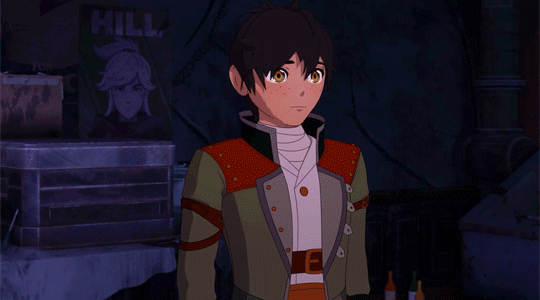
- - - - - - - - - -
Ozpin
For our favorite immortal wizard aka not quite dead Headmaster... I think the answer is rather obvious. When you're so careful with your words, but also so fiercely devoted to humanity, Words of Affirmation is a must. Ozpin constantly does his best to calm, to reassure. He's good at controlling the conversation and getting people where he wants... Except he more often than not use it to make them think and help them reach an healing ore motivating conclusion. This man is so insisten on giving and cultivating hope, so painfully aware of just how much words can change... There's no doubt in my mind that it's through these very same words that he tries to fight the darkness in others' mind, even when they don't want to let themselves be persuaded. And with some help from the farmboi, Ozpin is gaining in honesty and earnestness. And that can only help in giving comfort.
But to be honest... If you offer him a hug I doubt he'd refuse, and he definitely deserves one. Also therapy. For Oscar too.
Everyone in therapy 2k21.
“Ruby. I've made more mistakes than any man, woman, and child on this planet. But at this moment I would not consider your appointment to leader to be one of them. Do you?”
“It's not every day that friends are able to come together like this. Time has a way of testing our bonds, but it's nights like these that can help keep them stronger than ever. Nights like these are ones we'll never forget.”
“Don't worry, Mr. Arc. Your journey is far from over, and the same might be said for all of you. Unlocking your Semblance isn't the end. It can still grow and evolve. Providing you are willing to put in the work, who knows what could happen?”
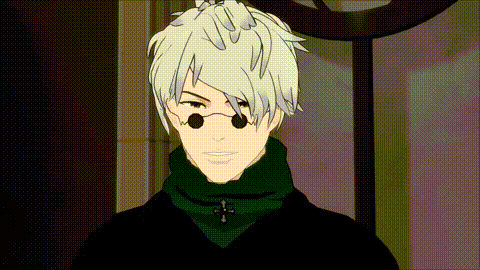
- - - - - - - - - -
Emerald Sustrai
Now here I'm gonna go ahead and say that the way Emerald has been taught to express her love and the way SHE would rather preffered to be loved most likely do not align. At the side of someone like Cinder, and even Mercury who isn't exactly the most emotionally vulnerable person; the only brand of love that gets an easy pass is Acts of Service, and that's probably what Emerald is the most used to. I can go on a mission with you. I can help. We go right back to the "I can be useful" mentality and I'm not sure she's been shown any other way honestly. Let's be real though : if someone offered a hug or some gentle words ? She'd probably pout & fuss but I hardly doubt she'd object.
“I don't care about Salem! But I owe Cinder everything. You want to fight her that bad? Be my guest.”
“I just... Cinder was the only family I ever had. She cared about me, taught me things... But without her here, I don't know if what we're doing--”
“I've been working on my Semblance. I can help. I won't tell anybody.”
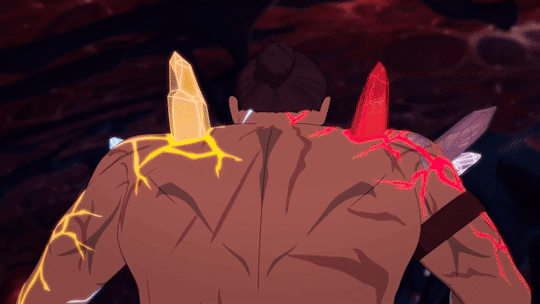
- - - - - - - - - -
Pyrrha Nikos
What's with everyone and dedicating their whole love toward just helping their teammates anyway they can ?! Stop ! But any way, you guessed it. I'm pretty sure one of Pyrrha's top way of showing love is Acts of Service, and nothing means quite as much to her as Quality Time. For someone who's been put on a pedestal and has a hard time relating to people; both touch and words can be a bit awkward. But if they're wrapped up neatly in a training session or semblance explanations ? Well that's already a more familiar area.
Pyrrha gives her whole to her friends and those she cares about. And in exchange, if anyone can simply... be there and spend time with her... May it be at the ball or simply sitting in the courtyard... I'm sure our girl would be delighted.
“Jaune, you know if you ever need help, you can just ask.”
“I'm constantly surrounded by love and praise; but when you're placed on a pedestal like that for so long, you become separated from the people that put you there in the first place. But thanks to you, I've made friendships that will last a lifetime.”
“I'll do it. If you believe this will help humanity, then I will become your Fall Maiden.”
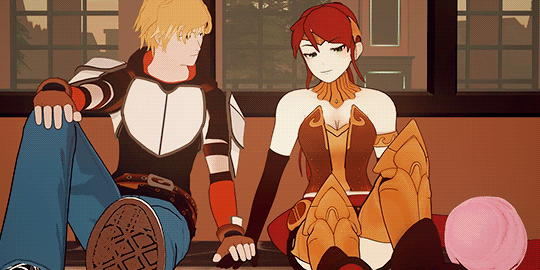
- - - - - - - - - -
Qrow Branwen
If I say Gift Giving for the corvid, is someone gonna hit me ? Come on it's fun ! Okay, more seriously... I think this kind of love conversation is kind of a necessity for Qrow. With a semblance such as Bad Luck, making everything complicated... Qrow tries to keep his distance from those he cares about. And since he's an emotionally repressed (but caring) asshole on top of it... Well that kinda narrows down his option. You know what DOESN'T put anyone at risk but can still bring smiles on their face ? GIFTS. Shiny things, souvenirs from his missions all over the world to give to 2 smol nieces. Sounds safe right ? That said, as any good emotionally unavailable character in this show, I gotta say Qrow probably has a thing for helping out and making himself useful in relation to Oz, Tai or the rest of the inner circle. So you know what that means *whisper* Acts of Service.
That said ! When it comes to receiving some love back... Qrow probably likes everything he doesn't allow himself to have. Soft touches, loving & comforting words, spending time with a friend without his semblance making everything complicated... We know that's all he wants.
“You idiot. I know you didn't do this.”
“Look, pal, I'm not sure who you are, but you need to leave my niece alone.”
“No one wanted me... I was cursed... I gave my life to you because you gave me a place in this world... I thought I was finally doing some good...”
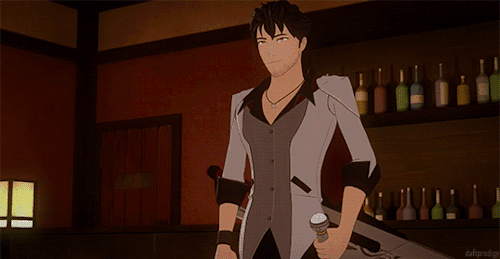
- - - - - - - - - -
Clover Ebi
And among our newbies (and gone too soon) friends we have Clover ! Clover was a very good contrast to our dusty old crow but also a great help. Kind-hearted, perceptive and honest; he knew just how to put Qrow's self-loathing in his place and push him to give himself some credit. He always had a nice word or a joke for everyone, and visibly the rock of the Ace Ops : an expert a keeping the moral up and the mood companiable. Evidently, Words of Affirmation was his expertise. Had things gone differently, I'm sure we'd have had time for many more earnest and helpful conversations with this teal-eyed fisherman.
“It's a good thing they had someone to look up to and get them through it. Not everyone is so lucky.”
“I meant deflect a compliment. Those kids wouldn't be where they are without you. You've had more of an effect on them than you realize.”
“We don't have to fight, friend.”

- - - - - - - - - -
Winter Schnee
And today in the "emotionally unavailable" category we have... Winter Schnee ! TALK ABOUT YOUR FEELINGS PEOPLE ! Just -
I would say look at Ruby but even she doesn't talk about her bad vibes... Nor does any of the "Words of Affirmation" peeps. Honestly what's wrong with y'all people ? Anyway
Winter cares so much. Is it hidden behind professionalism and a stern *big sister* demeanour ? Sure. But it doesn't negate just how much she loves her closed ones. She's fiercely loyal, and even if she doesn't let her personal feelings get in the way of her duty and doing what needs to be done, no one is allowed to say she doesn't care. Countrary to Weiss, Winter doesn't seem as good nor as aware of the love that exists in simply *being* with people. Rather, she's dutiful and ready to help any way she can when given the chance. You guessed it, yet another Acts of Service kind of love... Maybe I'm doing this wrong XD. I'm on the fence about Words of Affirmation as well. Despite her standoffish looks, Winter has always been very open & reassuring during her discussions with Penny. But she's more stern when it comes to Weiss so I dunno x)
“I don't recall asking about your ranking, I'm asking how you've been. Are you eating properly? Have you taken up any hobbies? Are you making new friends?”
“You've grown up a bit, haven't you? You're not the little girl clinging to the family name anymore.”
“You can't just buy trust like everything else! You have to earn it!”

And that's it for Part 2 ! I might do some other characters if people suggest some but I don't have a pressing need to right now. I have many ideas of songs to apply to various characters however so that's prob what my next posts will consist of (or fun templates)
If anyone has tips to create RWBY gifs or links to download the eps in good quality I'll take it !
Good day everyone !
#rwby#oscar pine#emerald sustrai#ozpin#winter schnee#qrow branwen#clover ebi#pyrrha nikos#love language#fair game#love langauges
87 notes
·
View notes
Note
♡ Archide and Oscar?
Who is the most affectionate?
At first definitely Arch. When they first get together it’s been a long time since Oscar has been in a relationship, or even allowed himself soft touch and gentle affection unless he was practically falling apart at the seams. He isn’t used to it anymore. But as time goes on and he once again warms up to caring for someone and being cared for he ends up just as affectionate as Archide.
Who initiates the handholding?
Usually Oscar, it’s never really a big thing, just absentmindedly reaching down and squeezing Archide’s hand because it’s there. They also both agree that handholding is great for temperature regulation when one of you is always super warm and the other is super cold. Archide jokingly calls themself Oscar’s portable ac unit.
Who worries more for the other?
It’s about even really. Because on one hand Oscar for a long time is very visibly a mess. The only good close relationship he’s really had is with his sister, who’s dead, and he’s been raised and then further conditioned by the lab to hold so much self loathing, not to mention his powers greatly affect his ability to function and sometimes even to move. On the other hand Archide was literally raised in the lab. They were raised to be a weapon, and they’re still learning how a life outside of that works. They’re not good at talking about their issues and they don’t always know how far is too far either. Oscar doesn’t want em to end up putting themself in danger.
They look after each other really, Oscar helps Archide with adjusting to a free life and with figuring out when to stop something. Archide helps Oscar to not be too hard on himself and on days when functioning is painful.
Who is more likely to ask for help?
Oscar definitely. As I mentioned before Archide isn’t always sure how to ask. Oscar’s became pretty good at telling when they need help though.
Who is the one always losing the keys?
Oscar again. He’s usually got 20 things on his mind so keeping track of things can get away from him. Archide has seen him mumbling to himself about his missing keys while holding them.
Who leaves little love notes for the other?
Archide writes actual notes occasionally, just cute lil reminders that they love Oscar. Oscar’s more the type to somehow put hearts on drinks or food to be cheesy.
Who can’t sleep unless the other is there?
Archide. It was really easy to get used to not waking up alone anymore. When Oscar’s powers are out of control and it’s not safe to sleep in the bed with him, they insist and grabbing a sleeping bag and sleeping on the floor.
Who is more likely to propose to the other?
Oscar proposes! But Archide accidentally messes it up Bc they notice him hiding something in his pocket and try and figure out what it is, so the surprise gets spoiled XD
They both still love the moment and Oscar says that Arch’s meddling made it even more special.
Who introduced the other to their family first?
This one’s kinda sad. Technically Archide introduced Oscar to their dad first, but they didn’t know that was their dad at the time. So formal meeting would be Oscar, he was trying to get back in contact with his parents so he could be allowed to visit Leslie’s grave, and he brought Arch with for emotional support.
It didn’t really go well. Archide doesn’t understand how people can be that cruel and rude to their own child. Oscar doesn’t have the heart to say that’s just how his entire family has always been.
Who is more likely to play with the other’s hair?
Archide has been known to bury their face in Oscar’s hair at random. They also try to steal his shampoo Bc they love the smell of it.
Who makes sure the other has meals/stays hydrated?
Archide bugs Oscar about this really often. He looses fluids more than the average person Bc of his high body temperature, so Archide has made it their personal mission to ensure those fluids are replaced as fast as they’re being lost. Oscar was already pretty good at this but he’s not complaining. He won’t admit it but he finds it kinda cute.
Who is more likely to stand up to anyone for the other?
Listen. Archide is ready to fight at any moment. They don’t care. Bigger opponent? Stronger? Who gives a sh^t? Not Arch. Especially not if the person messed with their husband.
Who is the most likely to prepare a surprise for the other?
Oscar loves to set up little surprises for Arch. Usually it’s just movie nights or an at home ice cream bar, but Archide always loves it.
Who makes the other pinky promise not to do certain things?
Oscar definitely. Whenever he’s worried that Archide might do something that would put them in danger he makes them pinky promise not to. Archide doesn’t know abt the fingers crossed thing so they always feel obligated to listen.
Who puts a blanket over the other when they fall asleep on the couch?
Archide. Oscar has been known to fall asleep at random places around the house. He’s a sleepy dude.
5 notes
·
View notes
Text
Queering KH Part 4: Hearts in Tune
Actually KH Finally lol
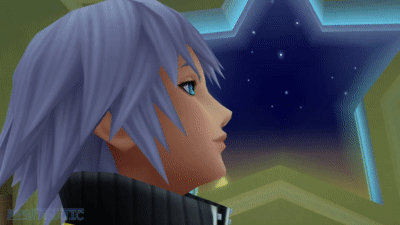
Pictured: Riku humming Sora’s name in a soft, adoring, wistful voice the way a swooning straight person sighs the name of their beloved of the opposite gender.
Kingdom Hearts gives off so many subtextual signals of queer coding that it genuinely BAFFLES me how people can really believe it is straight. You may be wondering what makes me so confident in that when there has not been anything in the games to explicitly prove any of the characters are not straight, and I will be happy to tell you. It is because in order to believe Kingdom Hearts is straight, you have to ignore WAY too much subtext. To truly believe that Sora is in love with Kairi and only coded to be interested in Kairi, you have to ignore his questioning of what love is. You have to ignore the combined keyblade he shares with Riku. You have to ignore how much the narrative is driving him to understand that Riku is his most important, cherished person. This all goes doubly for Riku who has a coming out story not unlike Elsa’s metaphorical one, in which his love for Sora is his greatest source of strength. You have to pretend the necklace gifting plot point is entirely straight and cannot possibly mean anything homoromantic. You have to ignore the way Sora cries while clutching Riku’s hand compared to his subdued and non-emotional reunion with Kairi- that’s just too much “accidental subtext” for me to confidently ignore lol. Intentional or not, KH is Gay~
Here’s how we’re gonna do this.
So where the hell do I even begin with coding KH? Well- I can’t possibly queer the whole of KH text in 1 summer, so what I plan to do is this:
Give you the tools to understand KH’s coding so that you can code it yourself~
Queer a few major KH scenes so that everyone can see that the proof is in the pudding.
I’m gonna try to break down various scenes to decode them and queer them so you can see what’s at play in KH. Originally when this meta was a single doc, I was only gonna cover 4 scenes. But since I’m breaking it into parts to update at my leisure, I’m gonna just add scenes and meta as I go~
Now without further ado:
How the Hearts in Tune scene is Gay Coded
This shouldn’t be too hard at all.~

This scene is almost too easy.
The scene opens with Sora bringing Mickey the sound idea he found but as it turns out, one sound idea is not enough. Sora tells us not to worry because he has a friend who is always picking up the slack for him. Likewise, on Riku’s end, he brings his sound idea to Mickey and is surprised to see that Sora’s sound idea is necessary to complete the song.
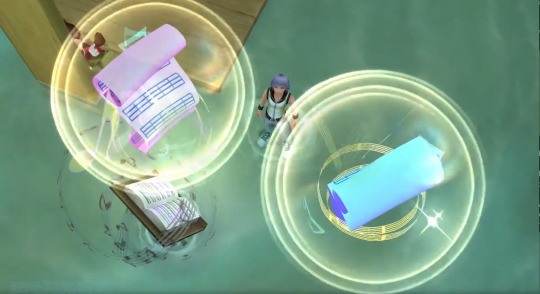
Once the sound ideas meet, this beautiful visual plays out in which the 2 sound ideas swirl around each other and the soundtrack title “Dearly Beloved” plays.
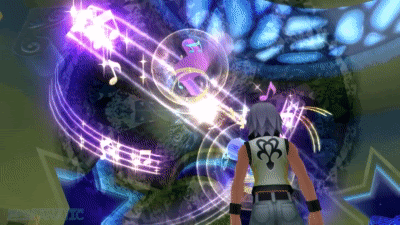
Now, there are several things I want to note about this sequence- heck this visual alone before we move on.
Recall earlier when I discussed Shiki’s point that blue and pink (likewise blue and red) “go together”, romantically.
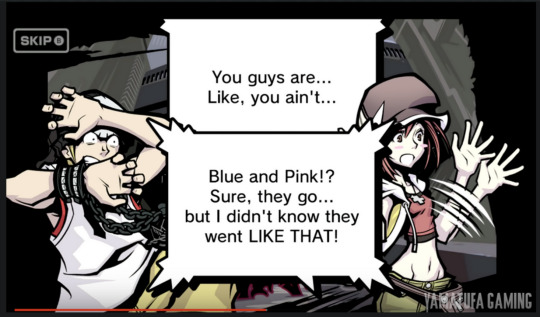
I will let the visual of Sora’s sheet music being pink while Riku’s is blue speak for itself. But I will also add how this ties into the yin and yang themes I’m about to discuss:
Yin and Yang
This concept gets its own section because it’s such an influential concept in so many aspects of various cultures around the globe.
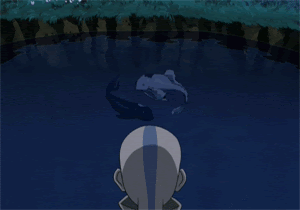
Yin and Yang is an eastern philosophy which illustrates the concept of dualism. In short, it is the concept that 2 opposite halves are complements to a whole. The original term in fact translates to dark-bright.
I am neither a philosophy professor or student so I will keep this as brief as I can and simply encourage you to study up on Yin and Yang at your own leisure. I will however paste this section from wikipedia because I think it is extremely helpful information to have for studying eastern media in general.
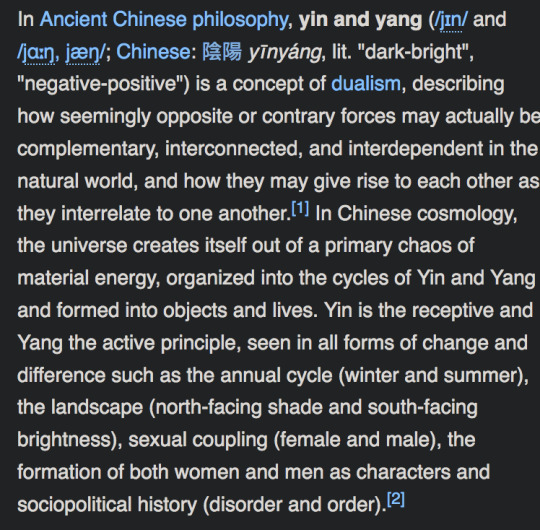
Yin and Yang: husbanded opposing forces. Dark-Light, Moon-Sun, Chaos-Order, Winter-Summer, Negative-Positive.
Female (Yin)-Male (Yang): Yes this is often used in a heteronormative heterosexual context because people are homophobic and believe in gender binaries, unfortunately, but I implore you to consider the concept in more figurative, spiritual, aesthetic themes, especially since Yin and Yang is a much grander philosophy than mere sexuality discourse; it’s about complementary forces creating a whole.
For shipping purposes, think opposites attract. Think concepts that are traditionally associated with femininity meshing with concepts that are traditionally associated with masculinity. Queer media has a wonderful way of subverting heteronormative Yin and Yang tropes by showing that cis-hetero standards can be hypocritically non-compliant with the complementary concept.
Rather than thinking of this, 2 heteros in love based on being just- the same person with opposite genders:
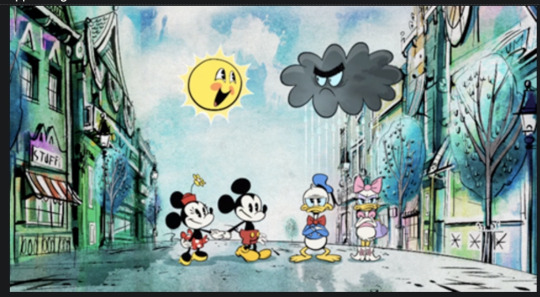
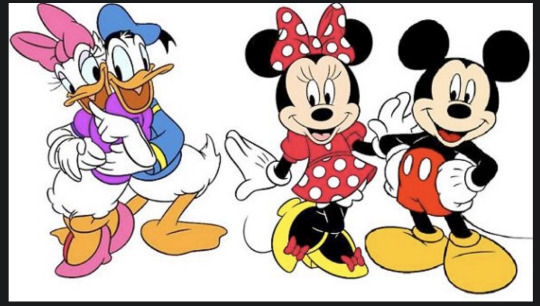
Think of this, same gendered couples with complementary personalities:
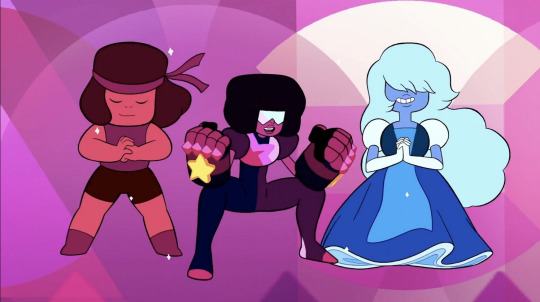
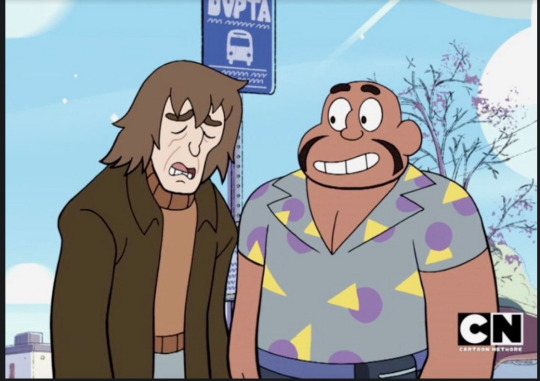
Think about how an aloof scrappy butchy vampire queen attracts an uptight calculating femme princess.

Think about how this goody-goody dumb jock with a martyring hero complex attracts this naughty cunning jock with a self-loathing villaness complex.
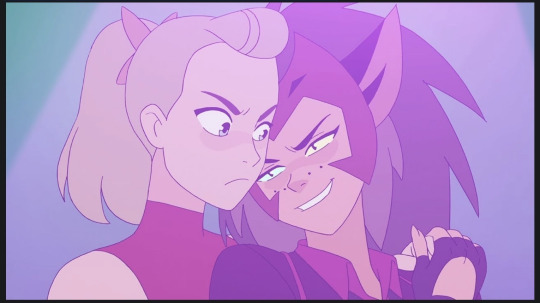
And now think about how badly we need more canonical mlm couples in children’s media lol. Oops my finger slipped. But I’m getting ahead of myself lol.
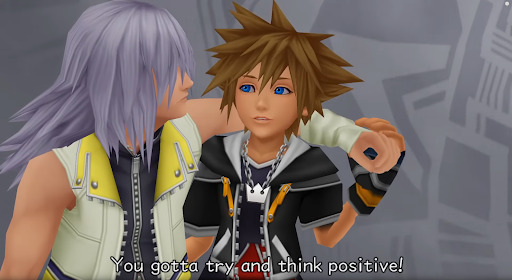
The concepts of interconnected opposite forces are so important and prominent in literature throughout the world, but yin and yang is ESPECIALLY important in Kingdom Hearts because it is a story that explicitly explores Light and Dark forces. It explores how they both oppose one another in catastrophic ways,
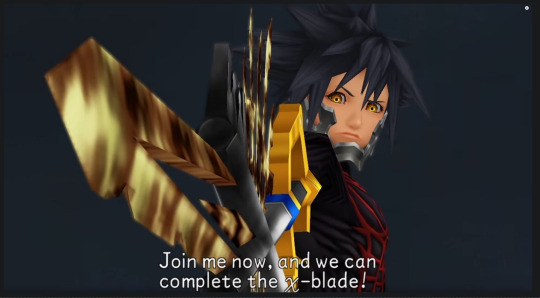
and how they complement each other in harmonious ways.

Getting ahead of myself again… But hey speaking of harmony, back to the matter at hand.
Hearts in Tune.

This scene shows a number of romantic symbols. As I was saying before the yin and yang tangent, pink and blue (nee red and blue) are already symbols of romantic suggestion. And in the case of them representing 2 parts of a whole song, these song pieces act as complementary halves, adding another layer of dualism to the scene. Furthermore, the music sheets swirl around each other in a yin and yang fashion. Harmony has been achieved. This lets us know these forces belong together. These forces representing Sora and Riku. They are husbanded together. These 2 hearts in question are part of each other. In fact, Mickey even says so:
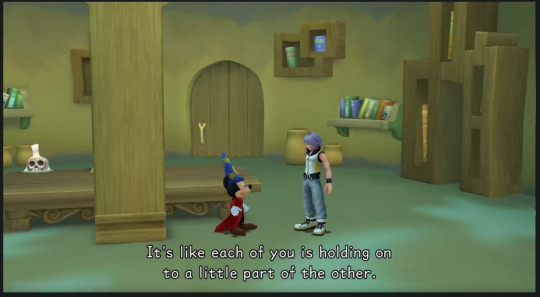
Perhaps most damning, however, is that the song in question is “Dearly Beloved”, arguably the theme song for Kingdom Hearts as far as the score goes. I’m sure it goes without say that “Dearly Beloved” is not only in itself a romantic sounding phrase but it is also the phrase specifically said by officiators of weddings to the congregation before the wedding vows are exchanged. “Dearly Beloved, we are gathered here today…”
I will also mention that Riku’s dream eater symbol visible in the shot is specifically designed based on a bleeding heart flower, a symbol of passionate love. Credit to Steam for pointing this out here, please follow them and read their posts they are magically delicious:

So almost everything about this scene is aesthetically romantically coded, and I didn’t even mention the fact that Dream Drop Distance’s whole color palette is themed with rainbows, which as I said earlier is absolutely still a gay symbol in Japan. Note the rainbow of colors animating from the sheet music.

So in terms of the atmosphere of the scene, its already incredibly homoromantic in every way I can think of. But what about the dialogue?
Well lets talk about the dialogue. Dialogue should always been read with care when you’re trying to queer a text. Often a lot of queer messaging in a text is subtextual. This means the text itself may actually say something gay, but you have to read further into it. This is an old method of queer writing designed to protect the writer from getting in trouble for their gay crimes.
Historical aside on this: If you’ve ever read Oscar Wilde’s “The Picture of Dorian Gray”, you may have note that Lord Henry can never just simply say that he is gay, lest Oscar Wilde be charged for homosexuality in 19th century England. Instead, Lord Henry simply tells us he is married to a woman, but makes it clear throughout the text that this marriage is mostly performative and he is not emotionally invested in it whatsoever, going against the puritanical, heternormative ideals of Victorian prudery. Lord Henry is by contrast MUCH more invested in following the life and times of his very close friend Dorian Gray, with whom he shares a hedonistic philosophy in the name of Fin de siècle. Not to be a downer but for the sake of understanding how real this subject of oppressed gay censorship is, despite keeping the homosexual themes as purely subtext, Oscar Wilde was tried and convicted of homosexuality and this book was used against him in court.
What we are privileged to have today with KH is a cutscene and not just a script. Meaning we have visuals, animation, voice acting, musical cues, etc etc to follow along with to enhance our subtext.
On Sora’s end of the conversation, Mickey points out that the song is incomplete with just his sound idea alone, and Sora tells him not to worry, as Riku is his dependable friend who will fill in where he fails. The text in the official English translation is:
Mickey: That's strange... Is one Sound Idea not enough?
Sora: Don't worry. I've got a friend out there who will help. He's always
picking up the slack for me.
This on its own sounds platonic. But note just how affectionate Sora’s voice acting is when he says it. Not only that, he clutches his heart to let us know how close he is to Riku and how much his connection with Riku matters to him. How much confidence he has in this friend he cares so much about. He then closes his eyes after saying it, smiling up in the air blissfully while he waits for their hearts to make their connection and finish the song.
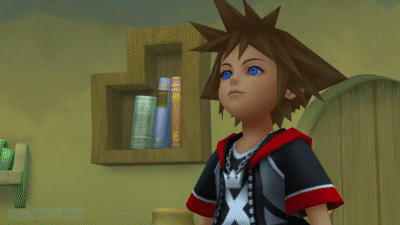
Once it is finished, Mickey remarks that their sounds joined together to make something more powerful. Sora then says looking thoughtful, “Yeah. Two forces are better than one. Right, Riku?”
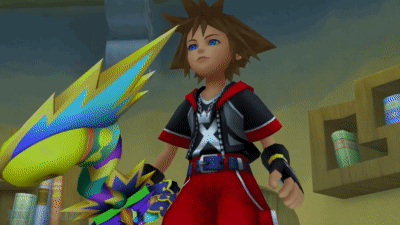
Following this, Sora leaves to fight the boss.
On Riku’s side, Mickey questions what happened, and Riku looks up thoughtfully, and says tenderly, “Sora.”

Mickey comments “Sora? Funny... Just hearing that name kinda makes me wanna smile.” and Riku tells him warmly, “Yeah. That's how he is.”
Mickey then goes on to say some really shippy stuff:
“Whaddaya know... Riku and Sora. The Sound Ideas you two set free joined together. And when they did, they made a great and powerful harmony.”
Riku then nods and tells Mickey brightly that “Sora can find the brightest part of anything, and pull off miracles like there's nothing to it. It's pretty hard not to smile around him.”
And I would like to pause to look at that line. “It’s pretty hard not to smile around him.” Although Mickey says the same thing, that just hearing Sora’s name invokes a smile, we sense a somewhat deeper meaning in Riku saying it. Why is that? Well, for one thing this game is entirely about Riku protecting Sora and exploring how much Sora actually means to him. This game is continuing Riku’s redemption arc from KH2, but it is also doing something perhaps even more important: it is providing him a journey of self discovery. This test resets Sora and Riku to level 1 so to speak, not just in their powers but even their models revert to variations of their KH1 selves. This helps to underscore Riku re-examining himself and his feelings.
And then guess what? Mickey makes some even SHIPPIER commentary. He exclaims “Wow! No wonder the music sounded like so much fun. But I bet he's got you to thank for that. Having such a good friend means he could really enjoy it.”
Riku is taken aback by this comment. “Huh?”
Mickey continues, expressing some extremely yin and yang themed sentiments,
“It's like each of you is holding on to a little part of the other. Your hearts are always in tune, so they're free to sing. Gosh, I hope I can be part of the team someday.”
Mickey did us a wonderful favor and expressed to us explicitly, for those who didn’t understand the romantic coding of the scene already, that Sora and Riku are a good match. Mickey tells Riku that the music sounded like fun in English, that it was a happy, pleasurable time, and tells him that Sora has Riku for a friend which is what must have made it so enjoyable.
So from this dialogue we get assurance that Sora and Riku are two very close friends, whose hearts are connected, and they are 2 powerful forces that merge into an even greater one. Their hearts are in tune.
Now if this were a scene about a boy and a girl, I doubt anyone would question whether it was romantic. Why should we be asked to look at it platonically just because it is 2 boys? The romantic imagery is clear.
And let me ask you this while we’re still on the subject of Dream Drop Distance:
According to Riku’s character files, he had previously thought of Sora as a little brother, and tried to be a cool older brother to him.
He then tells us that this has changed. What did it change to?
The surface level, heteronormative answer would say it changed to them being merely friends.
But isn’t that an odd regression? After all, found family is a thing, and that’s a bit weird for him to question since there is no reason for those feelings to change on that notion. If Sora loved him like a brother, that clearly hasn’t changed. Riku clearly loves Sora as deeply, so that didn’t change. The other problem with this phenomenon Riku is dealing with is that there is no reason for him to feel this strange sense of repression we keep seeing over this change. He is constantly holding back on some feelings for Sora but platonic and brotherly feelings are entirely acceptable. What is it that he is hiding? What sort of feelings for Sora would be hidden?
From the Kh2 Novel:
He really did want to see Sora and talk. But that was impossible with this appearance. The things that mattered the most were what he couldn’t tell Sora. It had always been that way.
What sort of feelings might be systemically oppressed?

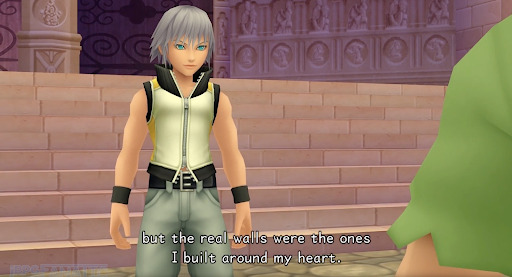
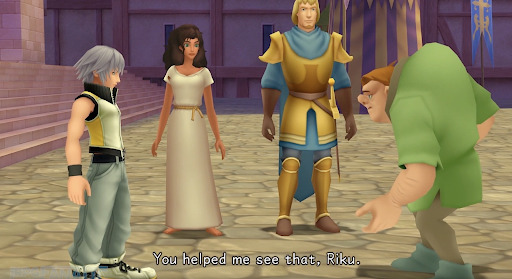
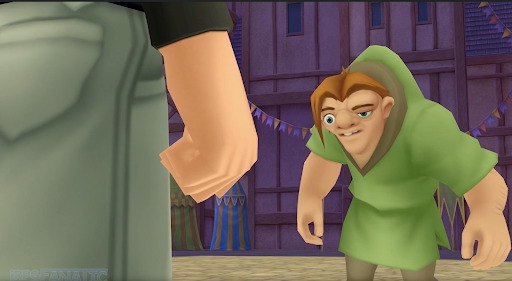
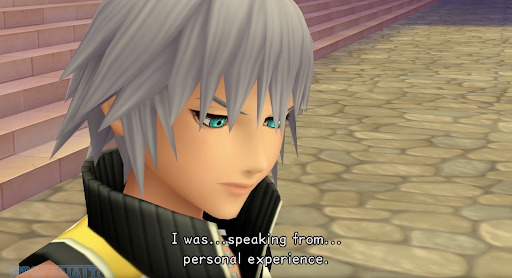
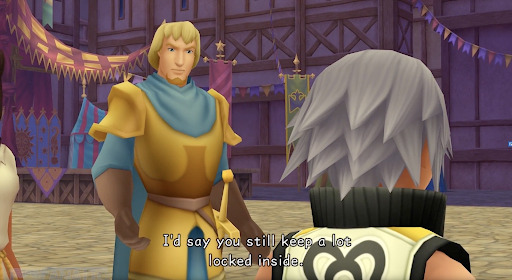
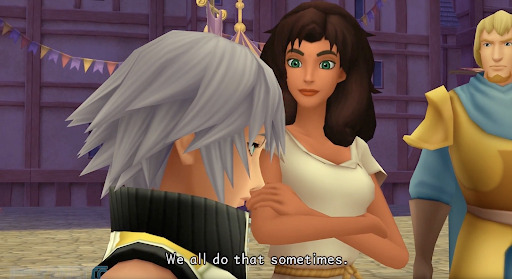
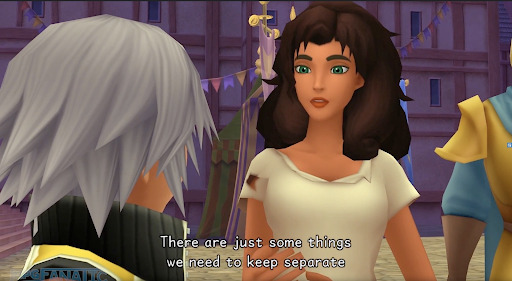
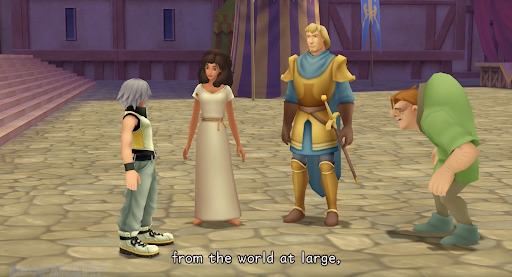
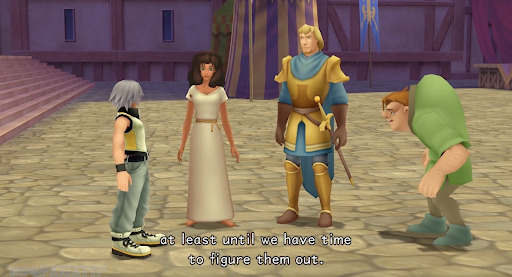
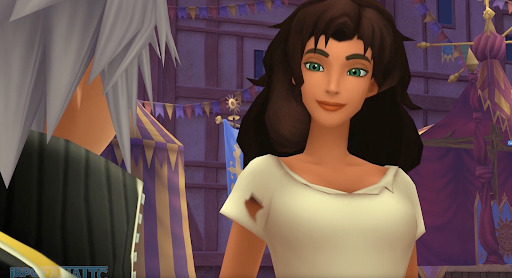

This scene is pretty much EXACTLY what I would do to say as explicitly as possible that Riku is gay without being able to say it outright due to censorship.
73 notes
·
View notes
Note
It'll forever grind my gears that Ozpin has been shitting on Ozpin's methods when they casually mentioned that THEY WORKED FOR OVER A MILLENNIA!! Has that been retconned??
Here I assume we mean “everyone else” as opposed to “Ozpin” (though given his self-loathing Ozpin probably does shit on Ozpin’s methods XD). I don’t know that I’d personally use the term “retcon” here though. Just because I associate that with very specific information that is then contradicted in an equally specific way. Like you said this character was a Senior and then, because you wanted them to stick around, they’re suddenly a Sophomore now let’s hope no one notices that (they will). Or it’s an unintended - and usually unavoidable - impact of introducing new information as the story progresses. Like The Next Generation creating the Cardassians and announcing that the Federation has been at war with them for years. It makes you reconsider everything that came before this episode like, “Where? Was that war??”
Something that RWBY has definitely rectonned has been aura. That began as a completely passive ability. Jaune got his unlocked and then boom, he’s done. From then on out minor injuries heal themselves and he’s able to withstand the same amount of damage as his peers. Then suddenly in Volume 5 aura was made to be active. Oscar had to consciously turn it on and off when that had never been a requirement before. Now, it’s clear that this was just a cheap way of showing how weak he supposedly was. “Oh look, Oscar doesn’t know to engage his aura so he takes a punch full in the face. What a rookie.” This didn’t exist before that scene and, notably, it had no impact later. By the time the Haven battle rolls around - just days later? - aura is back to being a passive thing that no one needs to worry about. Even the newbie character is able to fight Lionheart, a school headmaster, really, really well without once forgetting to keep his aura up or being unable to maintain it. That retcon existed solely for the three minute scene of, “Look how much Oscar needs to learn” and then his inadequacy was pretty much erased too with “Okay we want him to be a badass fighter now. Watching someone fail is boring.”
Ozpin’s situation... is more complicated. Because, to my recollection, we haven’t gotten a scene denying the previous info that these methods worked and worked really well. That understanding is also primarily inferred from the world building rather than us being told that explicitly by characters. Certain individuals in the RWBY fandom love to remind me that not everything needs to be explicit (“It’s show not tell”) and this is a perfect example of where I did draw pretty obvious conclusions based on information the story provided implicitly. We see everything associated with this “extraordinary time of peace,” we hear constantly about how Ozpin has a finger in every pie, so... surely that includes everything good too? Despite failing to make Ozpin a morally gray character, RWBY insisted heavily post-Volume 3 that Ozpin has basically been controlling the whole world. He’s supposedly so powerful that he pulls the strings of whole councils and can talk individuals (like Pyrrha) into doing things they’d never choose for themselves (/s). He made himself a god and then maintained that view of himself, even if he looks like a kindly headmaster now. Don’t be fooled by that goodie-goodie demeanor, he’s the puppet-master behind it all.. but every time this comes up it’s only in relation to bad things, more specifically bad things that the story has shown us are outside of Ozpin’s control (Pyrrha choosing to fight Cinder against Ozpin’s orders, Lionheart betraying him, Salem being immortal, etc.) No one ever admits, “Well if we really blame Ozpin for the state of the world then I guess we also have to ‘blame’ him for growing up in a relatively safe Remnant with excellent education and measures in place to keep the evil grimm queen from destroying us all.” It’s less of a retcon and more just the writing/characters straight up ignoring pieces of information and being hypocritical about others. We haven’t retroactively insisted, “Ozpin has been around a thousand years and the world became a bleak, horrible place as a result” completely contrasting what we saw in Volumes 1-3. That world building still exists, no one has denied it exists... they’re just not acknowledging that it exists either. The only time Ozpin is a powerful manipulator controlling the world is when someone dislikes something about that world. If it’s a good thing... no need to give credit. Even when the good thing is something the show demonstrated Ozpin worked for and the bad thing is something he never could have stopped and/or the very thing he told everyone not to do.
Basically:

51 notes
·
View notes
Link
With the film industry as we know it—A-list stars swanning around studio lots amid the swirling winds of an entire city bellowing buzzwords about makin’ pictures—essentially nonexistent at the moment, here’s an especially provocative idea as we contemplate its eventual return: What if Hollywood was... better?
Not in terms of quality of output, though if we’ve learned anything through the industry’s glacial inching toward progress, that will follow suit. But what if the industry was more inclusive? What if it was less afraid of change? What if it allowed gay people, people of color, women, and minorities to tell their own stories, to be in charge—and what if the people accepted it?
Better yet, what if it was always that way?
Like the loud, harsh clack of a clapboard coming down on 70 years of motion picture history, Ryan Murphy’s revisionist manifesto Hollywood arrives Friday on Netflix with blinding, blaring, technicolor confidence. Hardly subtle, deliciously ostentatious, and admirably mischievous, the lavish seven-episode series is a love letter to Hollywood by way of 2020 think piece.
It is messy and thrilling, upsetting yet profound; as uneven and as enthralling as any of Murphy’s big-swing, genre-contorting efforts: Glee, American Horror Story, or The Politician. But as with his soapy historical study Feud: Bette and Joan, it is a fastidious celebration of a glamorized time in Hollywood that mines nostalgia for modern meaning—a fragile undertaking swaddled in the dazzle of unmatched production design and talent pedigree.
Hollywood flops as often as it soars, but never rests in its grandiosity and ambition. The result is something escapist and frothy at a time when a retreat to a Hollywood happy ending is as alluring a fantasy as they come.
There is brilliant acting and there is bad acting. There are ovation-worthy ideas and there are off-putting ones. But, above all, there is reason to watch: It is gay, it is sexy, it is Patti LuPone.
Hollywood is a revisionist history of cinema’s golden age. It’s the 1940s in all their glamour and art: Casablanca! Citizen Kane! Alfred Hitchcock! Jimmy Stewart! Rita Hayworth! Cary Grant! It’s an era that’s been romanticized for so long that we’ve internalized it, morphing our own lifestyle aspirations to conform to its very heteronormative, very patriarchal, very (very) white ideas about sex and gender roles. These were ideas, however, that the industry was telegraphing, but not living in real life. Not at all.
Murphy and his team’s rewriting of history pulls the curtain back, exposing the sexually fluid proclivities of the stars—leading men sleeping with male escorts; Oscar-winning actresses in bisexual affairs—and the damning, racist barriers to inclusion fortified by studio heads thwarting any opportunity for progress.
Then, and here’s the crux of the whole thing: Hollywood changes that narrative. We glimpse the power dynamics inside Tinseltown’s gilded cage, and watch them being dismantled.
Some of the players’ narratives are real, and some are fiction. That makes for an amusing parlor game for viewers, attempting to separate the true history from the imagined one, and should birth a cottage industry of “The Real Story Behind…” stories in the weeks to come. But these are actual people who never had the opportunity to live authentically or see true, equal opportunity in the industry. Expect there to be a split among those who find happier, reimagined fates for them a sweet gesture, and those who find it in bad taste.
The story trains in on Jack (David Corenswet), a World War II veteran arriving wide-eyed in Hollywood, hoping some gumption and a jawline God shed a tear after creating will be enough to get him into the pictures. But he’s got a pregnant wife (Maude Apatow) to think about. Until he catches the eye of a casting director, he has to find some way to pay the bills. That cash flow comes surreptitiously from a gas station owner (Dylan McDermott), whose dashed Hollywood ambitions leave a soft spot for attractive dreamers like Jack—particularly ones who prove lucrative in his under-the-table prostitution business. A customer comes in for a fill-up, so to speak, and whispers the code, “I want to go to Dreamland,” and, well, you know the rest—and hopefully get the hardly nuanced metaphor about sex, power, sacrifices, and Hollywood.
This gas station business is without a doubt inspired by Scotty Bowers, the notorious L.A. hustler who died last year at 96, following a scandalizing, dishy documentary and memoir revealing the brothel he ran out of a petrol stand, sleeping with (allegedly) Cary Grant, Spencer Tracy, Bette Davis, Vivien Leigh, Gary Cooper, J. Edgar Hoover, and Rock Hudson.
McDermott’s character, however, is not actually Scotty Bowers, a distinction that’s necessary because Rock Hudson actually is a character, played by Jake Picking. So is Henry Wilson, the monstrous, closeted Hollywood agent played by Jim Parsons, who trades blowjobs for representation. Elsewhere, real-life trailblazers like Hattie MacDaniel, Vivien Leigh, and George Cukor show up. Their presence, on the one hand, lends credibility and grounds the fantasia of diversity and acceptance that Hollywood builds to. It’s also morally amorphous.
Hudson was closeted until the day he died of HIV/AIDS. He didn’t get the happy ending imagined here, publicly coming out of the closet by attending the Academy Awards with his fictional black, gay screenwriting boyfriend, holding hands on the red carpet, and staying on track on his ascension to Hollywood hunk. There’s also no evidence that Wilson, as caustic and self-loathing as the devil himself when we meet him in the show, had a change of heart and becomes a LGBT crusader seeking amends and atonement.
The wishful thinking is nice. But the bleakness of the reality shouldn’t be forgotten. There’s no clean place to land there, other than to consider both.
But these are just a handful of Hollywood’s players, and not even the true engine of the plot. In typical Murphyland fashion, there is a dizzying constellation of characters and their errant business to keep tabs on.
At the forefront is Patti LuPone’s Avis, the bored wife of a studio head (a scene-stealing Rob Reiner) who is first introduced as a client of Jack’s—hence all the press about the Tony winner’s explicit sex scenes that you’ve likely been reading—and eventually put in charge of the studio itself when her husband is incapacitated by a heart attack.
If it’s novel now to think of a female in charge of greenlighting projects and making commercial creative decisions, imagine it seven decades ago. And Avis shakes things up. With a casting director (Holland Taylor, perfect) and producer (Joe Mantello, heartbreaking) as her conspirators, she greenlights and positions as the studio’s next blockbuster a film called Meg, with its historically diverse creative team intact.
That means half-Filipino director Raymond (Darren Criss), black screenwriter Archie (Jeremy Pope), black leading lady Camille (Laura Harrier), and Jack and Rock in supporting roles. It takes willfulness to bulldoze the fortresses that bar progress. That is invigorating and moving to watch, especially as Hollywood dances between comedy, camp, earnestness, and tragedy with all the glee, if you will, that you’d expect from a Ryan Murphy production.
There’s sex—hot sex, gay sex, interracial sex, intergenerational sex—and there’s farce and there’s a wardrobe and set budget to sweep you away like a riptide.
There are scenes from Parsons and LuPone that will win them Emmys. Mantello and Taylor have a two-hander together that shattered me into so many pieces I am billing Ryan Murphy the cleaning fee. I worry that even with his Netflix money it won’t be enough—that’s how good it is.
Mira Sorvino and Queen Latifah give so much in their scenes as guest stars that you wish they were in more but are grateful for the flawless blips of bliss, while Michelle Krusiec as Anna May Wong, the first Chinese American movie star, is the epitome of an actor making a monumental moment out of limited material.
Criss solidifies his leading-man status—he’s captivating in every scene, even without much to do—and Corenswet brings glimmers of gravitas to eye candy. But the rest of the kids nearly torpedo the whole damn thing, they’re so miscast. The scenes with the older generation are so rich and such an utter joy to watch, it only makes the woodenness of performers like Picking and Harrier all the more egregious. Thankfully, there’s a larger message to it all that acts as absolution.
If Hollywood were a treatise on how society interacts with movies and TV both then and now, then the thesis could likely be boiled down to an early conversation between Raymond, Criss’ director character, and Dick, Mantello’s studio exec. It’s Raymond’s dream to direct a movie starring Anna May Wong. Dick kills the pitch, saying no one will pay to see a movie with an Asian lead, or any lead of color.
Raymond doesn’t stand for that. How does he know? No one’s tried. “Sometimes I think folks in this town don’t really understand the power they have. Movies don’t just show us how the world is, they show how the world can be. If we change the way that movies are made, you take a chance and you make a different kind of story, I think you can change the world.”
It’s not a stretch to argue that as the mission statement of Murphy’s entire career. He’s proved it time and again, from Glee to Pose: Bring the marginalized out of the margins and watch how things change. Someone just has to be the one to do it.
In essence, Hollywood sees Murphy dramatizing the progress that he played a part in catalyzing today, but imagining if it had come at a different turning point in cinema history—70 years ago. More tantalizingly, he raises the question of what society today might be like had it actually happened then.
Is it a little self-congratulatory? Sure. But, hey, that’s showbiz, kid.
#darren criss#the daily beast#hollywood#press#hollywood spoilers#just in case#april 2020#hollywood review
39 notes
·
View notes
Note
I just spent hours going through the search results for ‘meta’ on your blog, and there’s so much interesting stuff there, and it’s way too late at night now, but it was so worth it. Anyway, I love your leverage meta and was wondering if you could talk about the leverage crew interacting/working with others? (ie two live crew job, the last dam job), especially when they’re allies and/or people they’re actively working against in different scenarios (like chaos)
First of all, thank you so much nonny, that means so much to see that you appreciate my meta! I put a lot of thought into it and it gives me such joy to see that others appreciate my rambling and overthinking about fictional characters. Truly, you have made my evening. ❤️ ❤️ ❤️
Second of all, this is such an interesting meta question and I’m excited to answer it!
Oh man, if anybody was in any doubt that the Leverage team are hugely protective of each other, their interactions with their allies would blow that misconception out of the water. Note that I’m not including Sterling in this because that would be a whole post by itself and I personally don’t see Sterling as an ally. He’s been their ally at times but they’ve never really trusted him--he’s more like a comfortable antagonist. But anyway.
When the team has to deal with an ally, or team up with anyone really, they close ranks. Mr. Quinn is a bit of an exception since Eliot has no personal beef with him (more on that later) but Tara, Chaos, Archie? Slamming the fucking door in their faces. Maggie is the only real exception (gonna tackle her last). No matter how many squabbles might be going on, no matter if the rest of the team wants to strangle Nate with a piano wire (in a loving way), once someone else is introduced, they prove what a family they have become by uniting as one and going, and whom the fuckst might you be?
Let’s start with the longest ally relationship they have: Tara
Tara was, I think, a great addition to the team. I think she really challenged them and in ways that they needed. Eliot, Hardison, and Parker all quickly latched onto Sophie as a mom figure (in different ways--Eliot behaves like an oldest sibling with her, he’s old enough not to need her anymore but he knows he can turn to her if he needs her and she’s his ally when they’re making decisions, but Parker heavily relies on Sophie for guidance). Having Sophie ripped away from them forces them to stand on their own two feet more. It forces them to deal with Nate themselves instead of using Sophie as a shield. And Nate, well, we all see how he falls apart without Sophie and tries to blame her when it’s really himself.
The team closes ranks around Tara immediately. Nate doesn’t kick her to the curb for two reasons only: they need a grifter, and Sophie trusts Tara. Tara’s beautifully unapologetic behavior (insisting on getting a profit from their jobs, not babying Nate) doesn’t help in keeping the team at arm’s length, but Tara knows her worth and knows they’ll come around, and sure enough, they do.
Oddly enough, Tara’s really great for the team because they prove to themselves that they really are a family by her being there. Season one’s theme, as stated by the producers/writers, is all about family, and in season two we see the team really internalize that and realize that it’s true, they are a family. Through the adversity of losing Sophie and having to adjust, they recognize what they have truly become.
(I would argue that this is also the season where the OT3 realizes how deep their feelings for one another are as a result, but that’s another post for another time.)
By the end of the season of course we see them accept Tara as a friend and ally even if they’re loathe to admit it because all the members of the team are loathe to admit when they’re wrong about something. But their interactions with Tara show the team how they’ve become set in their ways, in their dynamic, and makes them question why, and makes them realize what a family they are.
Which is why it’s such a beautiful ending with Nate going to jail and the feeling of betrayal when they realize he’s not coming with them--they’ve spent all season going oh shit, we’re a family, we’re really in this together, okay, and then to have Nate make his plan without them and to abandon them even if you can understand that he did it to protect them...
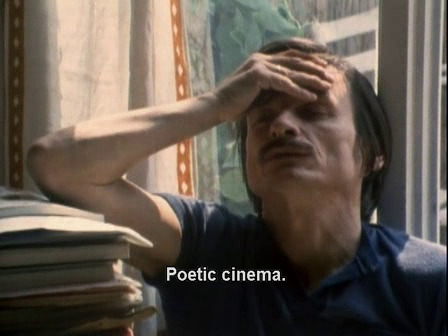
So yes, the team’s interactions with Tara basically show them what a family they have become and set the entire thing up for Nate’s sacrifice at the end of the season, bless you Tara, you queen, I’m single, please call me.
The other ally that the team has that they’re automatically sort of forced to accept (the way that because of Sophie they were forced to accept Tara) is of course Archie.
That motherfucker.
Look Archie is a charming bastard but he’s still a rat bastard and I will punch him in the face if I ever meet him and y’know what he’ll probably understand. The fact that in The Last Dam Job we see him say to his bewildered daughter “that’s my daughter” about Parker, proving that he STILL, after EVERYTHING, hasn’t introduced Parker to his family? Ahaha. We are in a fight, sir, we are in a MASSIVE fight.
Archie only appears in one other episode but like Nate’s dad shows us so much of who Parker is and why she’s the way she is. We’ve got Parker’s family backstory, her asshole father whom she killed, but there’s still a big gap between that and how she became a thief, and Archie fills that gap. And the way the team reacts to him is fantastic because the only one who closes ranks around him is Nate.
Nate, who also has a rough relationship with his father, Nate who treats Parker like his own daughter, Nate who mentors Parker into becoming a mastermind. Nate who was also a father. Nate hates Archie, because Archie should’ve helped teach Parker to become a person, and instead he taught her to become a weapon.
Hardison, Eliot, and Sophie? They are extremely protective of course and they are not fans of Archie, but they are a bit busy getting Parker to safety, they respect how important Archie is to Parker, and they are proud of Parker. They know who and what she is. They know that Archie will see the proof in the pudding.
But Nate, Nate is so goddamn offended, and I think this is the moment he realizes that Parker really is like family to him, and really takes responsibility for her growth. I think this is the episode where Nate goes, oh, she’s going to be my successor. Parker is going to be the new mastermind.
It’s so great to watch as Nate’s the one knocked off-balance by an ally, rather than the OT3, showing his hand more than the others.
Then there’s the other main player during The Last Dam Job: Chaos
Oh Chaos. We all love to hate you. Chaos is absolutely everything that fuckboy nerds often are, the thing that makes women hide their love of geeky things, he is the gatekeeping asshole that thinks nerds are still the most oppressed class and probably goes on rants about fake geek girls.
The seething hatred that Parker, Hardison, and Eliot have for Chaos is hilarious but understandable, but what’s interesting is how nobody in the team seems surprised by what an asshole Chaos is. Sophie and Nate just kind of roll their eyes at him. Eliot’s angry at Chaos for Parker and Hardison’s sake. Hardison feels that his professional pride is offended, that anyone would ever consider Chaos and Hardison to be in the same category, and he’s angry at how Parker is treated by him. And Parker is pissed off by Chaos’s objectifying comments.
But none of them seem surprised.
You know the moments when the team is taken aback in disgust by someone, we see it all the time when a team member realizes just how awful a mark truly is. Even Nate has his moments where you can see him actively wondering if maybe he should just scrap the whole plan and throw the mark out the window. But with Chaos, it’s par for the course.
Because sadly, very sadly, as I said--Chaos represents what we expect nerds to be.
Okay so brief history recap, the whole ‘nerds get bullied’ was a thing that absolutely happened for a period of time back when reading comics and science fiction was considered lowbrow. Comics were for younger children, not high schoolers, fantasy writers were considered hack writers (you can read Ursula K. LeGuin’s excellent essays on the matter), and in fact a lot of parents thought reading comics and science fiction and the like was bad for you. Then when computers first came onto the scene, they were very new and difficult to navigate. Something parents are finding nowadays is how damn easy it is for their young kids to navigate and use electronic devices, and so kids will often, to the horror of their parents, get onto social media sites and see things they shouldn’t because the parents didn’t realize how easily their child could access and learn to use these things. Because back in the ‘80s, it was a lot harder to navigate the internet and computers. So if you were hugely into them, you were an outlier.
But those days of comic books, science fiction, and computers being things that only fringe communities got into are LONG gone. Women have always been a part of those communities although, surprise, nobody wants to mention it, and they’re even more so nowadays. Even when Leverage was being filmed, superheroes were cool! Several Batman movies had been wildly successful, the Sam Raimi Spiderman films had been box office hits, Lord of the Rings had won A MOTHERFUCKING OSCAR. In fact, it SWEPT THE OSCARS.
Geeks and nerds were no longer someone to laugh at and bully, especially straight white male nerds. And yet, these sad excuses for human beings continue to whine and bully and show their true racist, misogynistic, self-centered mindsets by insisting that they are bullied and ignored and can’t get dates because of their “nerdy” interests.
Newsflash: it’s not because of your interests, it’s because you’re assholes.
Chaos represents that. He is the WORST kind of nerd, and unfortunately, probably the kind of nerd that gets into the criminal world because he has a superiority complex and a chip on his shoulder. So if you watch the crew, they’re all pissed off by him, but none of them are surprised by him.
In fact, that’s why they recruit him for their team in The Last Dam Job!
Chaos tried to murder Sophie, he tried to murder Sophie’s old friend, he makes derogatory and objectifying remarks about Parker, and it’s all EXACTLY par for the course for hackers. Hardison is the hacking exception. He’s a gentleman, he’s black, he’s emotionally mature and aware, he’s thoughtful, and his “age of the geek, baby” catchphrase isn’t bitter and plotting “oh how I shall make you all rue the day you bullied me” it’s ecstatic and fun. He knows that the people who don’t appreciate his skills will come around in time. He’s not going to be an asshole about it.
The team recruits Chaos for the job not just because he’s the last person that their enemies will expect but because if they went out to find another hacker, they’d run into people who were just like Chaos in personality and behavior. Chaos is, at least (and ironically given his moniker), a known evil, he’s someone they understand and therefore can to a certain degree control. The team goes damn easy on him during this job. They could’ve taken the opportunity to make his life MISERABLE while he was distracted working for them. But they didn’t. They just roll their eyes and make quips about wanting to kill him.
Note that the other people in the Two Live Crew Job, the hitter and the thief, are treated very much as novelties. Eliot and Parker seem amused by them like they’re shiny new toys, but we also get the impression that they’re glad to see the back of them because the shine of these new toys would wear off rather quickly. Meeting someone who’s exactly like you is fun for a short bit but it can’t last--you’re too alike for any kind of relationship (platonic, romantic, or otherwise) to work long-term.
Chaos is hated by the team and they absolutely close ranks around him. Eliot and Hardison don’t even take their eyes off him and Eliot tells Mr. Quinn to do the same. The whole team works to keep Chaos away from Parker so that she doesn’t even have to deal with his presence. But given the insane revenge that the team has planned against others who’ve tried to kill them, and especially given that the last time someone made Parker upset Eliot and Hardison literally offered to kill the man, it’s unusual that they let Chaos off so easily. And it’s not out of a sense of “you’re our ally” honor. They screw over Sterling when he’s supposed to be their ally as well (although Sterling is also screwing over them, so...) so it can’t be that.
I honestly think it’s that they feel that Chaos is one symptom of a disease. He’s one type of cancer in a long, long line of cancers. Knock him down, and another incel asshole is gonna take his place.
So why bother? Why bother, when instead they can just keep Chaos on a tight leash. Better the devil you know, and thanks to his inability to shut up and his ego, they know Chaos very, very well.
Then we have Mr. Quinn, who is very interesting in that he’s one of those instances where you have to read into Eliot’s silences to get a lot about him. Now, unlike Moreau, I’m not saying that Quinn and Eliot were ever a thing. They could’ve been, sure, but I don’t personally get that vibe from them. What we get from Quinn is a window into how the rest of the criminal world sees Eliot.
Now, we learn in The Girls’ Night Out Job what the criminal world thinks of Parker. “You’re the Parker?” People know of Parker and how crazy she is, even if they don’t necessarily know her gender. We get a lot of what the criminal world thinks of Sophie, from Sterling to British nobility to everything and everyone in between. Hardison doesn’t have as much of a repuatation yet but as I’ve stated elsewhere Hardison is twenty-two at the start of the series, he’s still establishing himself, even in the relatively young game of hacking. But other than Damien Moreau, we don’t really get a huge look into what people think of Eliot (and Moreau isn’t even a proper look at Eliot the professional, he’s a look at Eliot the person, but I’m not recapping my entire goddamn Moreau/Eliot meta it’s under my tag y’all can go find it).
So Quinn is our one foray into how Eliot is seen by the criminal world, and the overwhelming emotion is: respect.
Unlike Chaos, or even Parker and her counterpart from the Two Live Crew Job, Quinn and Eliot respect each other and don’t take anything personally. They sort of accept that they’re on opposite sides out of a sense of honor--staying loyal to the person writing their checks--but it’s nothing personally antagonistic. And we see this with the other hitmen that Eliot tangles with 90% of the time. There’s no personal beef, it’s just doing their job, (and we get hilarious exchanges like Eliot being frustrated with amateurs, “how are you gonna improve,” etc), and that’s extremely fascinating considering how very personally Hardison, Sophie, Parker, and even Nate take it when they’re up against someone of their own field.
It all, for me anyway, harkens back to the talk between Sophie and Eliot in the boxing ring about Eliot’s rage and violence, and how he explains that he doesn’t let it own him and he has it under control. Being a hacker is who Hardison is, being a thief is who Parker is, being a grifter is who Sophie is (and that’s part of what spurs her season two journey to find herself), and Nate, well, we all see for five seasons how Nate struggles with his sense of identity. But Quinn and other hitter allies show us that being a hitter is what Eliot does, it’s not who he is. Eliot is a chef, he’s a boyfriend, he’s a lover, he’s a protector. He separates his identity from the job and it’s incredibly healthy of him and he’s possibly the only one of the team who can do that and I think that’s absolutely fascinating and another way in which the Leverage writing team uses Eliot to deconstruct the trope of the violent small-town white army boy hitman and blow it up to smithereens.
Because normally, Eliot would be the person most married to his job, the person least in touch with his emotions, the person constantly tempted by violence and to lose himself in his role. But instead he can walk away from it. In fact he wants to walk away from it, he wants to distance himself from the violent person he became and the things he did, he wants to become someone new (and did, when he fled Moreau and Toby taught him how to cook).
Mr. Quinn is our key to going, oh huh, hitters and bodyguards, ‘retrieval experts’, they don’t identify themselves with their jobs the way the other roles do, and that sets up a really interesting dynamic and I love it.
Finally, we have arguably the most interesting ally, which is Maggie.
A quick note on Maggie: While she is an ally, Hardison, Parker, and Eliot seem to view Maggie as separate from most of their other allies because she’s Nate’s ex-wife. Tension with Maggie comes more from Sophie and Nate. Eliot does flirt with her and score the date with her but the moment he realizes who she is he seems to go on the date purely for spying purposes for Nate--her being Nate’s former anything immediately puts her in this special category for the OT3 where they’re more excited to watch Nate responding to her than they are anything else. The OT3 don’t see her as any kind of threat--they rightly recognize that any interpersonal issues attached to her are Nate’s to deal with, and the OT3 have always been good about detaching themselves from Nate’s problems, calling Nate out on them, and not taking on Nate’s problems like they’re their own.
And I love how they write Maggie. She’s an ally who’s a civilian and the team treats her differently as a result. The OT3 want her for juicy information on Nate. She’s never once treated like a harpy, like a bitch, as a one-dimensional prop for Nate’s backstory. Sophie likes and respects Maggie. Maggie is a foil to the team because she reminds all of them of Nate’s fallibility, and she really shows them how they’re seen in the eyes of the public. She likes them, she’ll even join them occasionally, but she doesn’t 100% endorse them, and the team knows it, so they use her judiciously. In The Last Damn Job they use her precisely because she’s not a criminal, and you know that the team would welcome her into their lives if she wanted it, but also maintain a distance out of respect. They all adore Maggie, they find her fascinating, and it’s such a delight with the way ex-wives or ex-girlfriends are usually written.
They say that to really know a person, you have to know their friends and their enemies. And that holds true in this show. To see the status of the team, you have to look at how they treat their allies and their enemies, and so through seeing their allies, you see the team better. And I love that. A+ writing.
So those, nonny, are my random rambling thoughts on the team’s allies! Sorry it took me a few days to get to this, I hope you enjoyed it!
223 notes
·
View notes
Text
Filtering Female Characters Through the Male Gaze
Female characters filtered through the male gaze: A (way) too long post about why we need a more diverse and inclusive approach to staffing showrunners, writers, directors, crew – heck, all roles -- in TV and movies.
Yes, I know I am not the first person here on this.
And note that while I have included a few tags b/c I talk about my frustration with Shadowhunters, Veronica Mars, the Irishman, Richard Jewell, and a few other recent shows/movies, I don’t get to this stuff until the very end, I appreciate that fans may not want to wade through the entire essay, which (again), is a bit of personal catharsis.
I recently had a random one-off exchange with a TV writer on twitter. The writer said that she had enjoyed the movie Bombshell much more than its Rotten Tomatoes rating would have suggested. She wondered if the disconnect between her experience/perception of the movie and that of mainstream reviewers might have been shaped by gender: Specifically, she observed that Bombshell is a movie about women, but most reviewers are male.
I have complicated feelings about Bombshell. On one hand, yes, there was and is a toxic culture at Fox News. Yes, Gretchen Carlson and Megyn Kelly were victims of that toxic culture. But no, these women were not mere bystanders: They traded in the racism, misogyny, and xenophobia (for starters) that still characterize Fox News today. Why should these wealthy, privileged white women – both of whom spent many years as willing foot soldiers in the Fox News army -- get a glossy, Hollywood-approved redemption/vindication arc? On the other hand, I am glad that the movie makers made a film about sexual harassment, and that the movie presented Kelly, in particular, as an at least somewhat complicated character. This would not be the first time that a movie about women – especially complicated, and not always likeable women – has proven to be polarizing.
My ambivalence about Bombshell notwithstanding, the writer with whom I exchanged tweets is (not surprisingly, since she is in the industry and I am not) on to something when it comes to gender, character development and critical reception. It’s not just that Bombshell was about women, but reviewed largely by men; it’s that stories about female characters (real or fictional) often are filtered through the male gaze in Hollywood: On many projects – even those focused on female characters – creators/ head writers are male, directors are male, showrunners are male, and producers are male. This matters, because preferencing the male gaze impacts what stories about women get told, who gets to tell them, and how these stories are received inside and outside Hollywood.
First, though, the caveats. I do not mean to suggest that men can never tell great stories about women. Of course they can. I also don’t mean to suggest that being female exempts creators, writers, directors, showrunners, etc. from sexism or misogyny (or any other forms of bigotry, as my discussion of Bombshell suggests). There are plenty of women who prop up the patriarchy. Rebecca Traister’s work speaks to this issue, as does the work of Cornell philosopher Kate Manne. There is an important literature on the concept of misogynoir (misogyny directed at black women, involving both gender and race), a term coined by black queer feminist Moya Bailey, as well. Intersectionality matters in understanding what stories are told, who gets to speak, and how stories are received in and outside Hollywood. I also don’t mean to suggest that there are no powerful women in Hollywood. Shonda Rhimes; Ava DuVernay, Reese Witherspoon (increasingly, given her role as a producer of projects like Big Little Lies), Greta Gerwig’s work in Lady Bird and Little Women, and others come to mind. As I am not in the entertainment industry, I am sure others could put together a far more complete and accurate list of female Hollywood power brokers. And, finally, I appreciate that Hollywood is a business, and people fund and make movies that they think their target audiences want to see. So long as young, male viewers are a coveted demographic, we are going to see projects with women who appeal to this demographic onscreen.
Given these caveats, why do I think that the filtering of female characters through the male gaze is an issue? For me, it has to do with a project’s “center of gravity” -- that place, at the core of the project’s storytelling, where the characters’ agency and autonomy comes from. It’s where I look to understand the characters’ choices and their narrative arcs. When a character’s center of gravity is missing or unstable or unreliable, the character’s choices don’t make sense, and their narrative arc lacks emotional logic. Center of gravity is not about whether a character is likeable. It’s about whether a character – and the project’s overall storytelling and narrative voice – make sense.
When female characters are filtered through a male gaze, a project’s center of gravity can shift, even if unintentionally, away from the characters’ agency and point of view: So, instead of charting her own course through a story, a female character starts to become defined by her proximity to other characters and stories. She becomes half of a “ship” . . . or a driver of other characters’ growth (often through victimization, suffering, or self-sacrifice) . . . or mostly an object of sexual desire (whether requited or not). Eventually, she can lose her voice entirely. When that happens, instead of a “living, breathing” (yes, fictional, I know) character, we are left with a mirror/ mouthpiece who advances the plot, and the stories, of everyone else.
What are some recent examples of this? The two that I have mentioned recently here are Shadowhunters and Veronica Mars S4.
- With SHTV, I will always wonder what might have been if the show – which is based on books written by a woman, intentionally as a “girl power” story – had female showrunners. Would an empowered female showrunner have left Clary, THE PROTAGONIST OF A 6 BOOK SERIES – alone on an NYC street in a skimpy party dress, in November, with no money, no ID, no mother, no father figure and no love of her life, stripped of her memories, her magic, and chosen vocation, as punishment, after she saved the world? Would a female showrunner have sidelined Clary’s love Jace, and left him grieving and suicidal, while his family lived their best lives and told him to move on? Would a female showrunner have said, in press coverage of the series finale, that the future of the Clary and Jace characters was a matter for fan fiction? After spending precious time in the series finale wrapping up narrative arcs for non-canon and/or ancillary characters. And to my twitter correspondent’s point, I guess I am not surprised that mainstream entertainment media outlets didn’t call out the showrunners’ mistreatment of Clary, and by extension, Jace, and the obliteration of their narrative arcs -- and yes, I am looking at you, Andy Swift of TV line (who called the above-mentioned memory wipe “actually perfect”).
- Likewise, with Veronica Mars, would a more diverse and inclusive writers room have made S4 Veronica less insightful and less competent than her high school self, or quite so riven with self-loathing, or quite so careless and cruel with the people in her life who love her? Would a more inclusive creative team have made S4 Veronica less aware of the class and race dynamics of Neptune, yet more casually racist, in her mid-30s, than she was in high school?
- There are so many other examples from 2019. Clint Eastwood falsely suggesting that a female reporter (who is now deceased and thus unable to defend herself) traded sex for tips from an FBI agent in Richard Jewell. Game of Thrones treatment/resolution of the Ceresi and Daenerys characters – where to even start. Martin Scorsese’s decision to give Oscar winner Anna Paquin’s character a total of 7 lines in the 3-plus hour movie the Irishman.
- And, in real life, I wonder whether a Hollywood that empowered and supported female creators would make sure that people like Mira Sorvino and Annabella Sciorra got a bunch of work while also making sure that Harvey Weinstein never again is in a position of power or influence. Same with female comics targeted by Louis C.K. Matt Lauer, Charlie Rose … the list is long, and Kate Manne’s work on what she calls “himpathy” is useful here.
To be clear, I am not saying that stories involving “ships” of whatever flavor, stories of suffering and self-sacrifice, and stories of finding (or losing) intimate relationships are “bad” or “wrong” or inherently exploitive of female characters. I don’t think that at all. I also don’t think that female characters have to be perfectly well-adjusted, virtuous, or free from bias, or that they should never be make bad choices or mistakes. I want female characters who are flawed, nuanced. I don’t mind lives that are messy, or romantic entanglements that are complicated. Finally, I don’t think that that faulty, reductive, or unfair portrayals of female characters is a new thing. Mary Magdalene was almost certainly not a prostitute, after all. And classicist Emily Wilson – the first woman to translate the Odyssey into English – has brought a hugely important perspective (including an awareness of how gender matters in translation) and voice to the translation and study of canonical characters and works.
At the end of the day, I just want female characters to be able to speak with their own voices, from their perspectives. I want them to have their own, chosen, narrative arcs. I want them to speak, act, see, and feel as autonomous individuals, with agency, and not just in reference to others. And, I think that more a more diverse and inclusive approach to staffing writers rooms and in choosing show runners, directors, and key positions in storytelling would help.
57 notes
·
View notes
Note
hi! i'm reading furuba and there's something i don't quite understand so can i ask you a little question? so after tooru fell and ended up in the hospital why does everyone acting so rude and accusatory towards kyo? saying it's his fault, he need to apologize etc. i suppose they are doing this to help (?) but it feels so hurtful... and overall i can't help but feel so sad for kyo during the progression of the story, people treat him so poorly and i barely see anyone actually being kind to him :(
Hello anon!! Thank you for this question!! The hospital arc is really the toughest one on kyo :( but it’s also the same arc that finally gave him a reality check. Kyo’s biggest flaw has always been that he’s too (unintentionally) self-absorbed with his issues. His struggle to deal and cope with his trauma has had a disastrous effect on his relationship with the people he interacts with like kyoko, kazuma (for that period in time he refused to let himself call kazuma as his dad), and to a really great extent yuki. It reached its peak at the hospital arc, when instead of accepting tohru’s feelings for him, kyo, blinded by a really awful mixture of guilt over kyoko’s death, his self loathing, and the sincere expectation that there was no other future for him except for being imprisoned for eternity, said some really terrible stuff to her
No one is truly, sincerely blaming kyo though. Cat boy really had too much stuff going in his head. The problem was, not only did kyo really really hurt tohru, because of his brooding, he ended up never going to the hospital to visit her at all. Whether or not for understandable reasons, it certainly pissed off a bunch of people. Yuki was the first one to confront him because at this point, he’s just fed up with kyo’s infinite problems. Tohru fell from a cliff, sustained serious injuries, and is literally confined in a hospital!!!! Meanwhile kyo, the closest person to tohru, the person tohru’s so clearly in love with and vice versa “that it’s obvious even to a middle schooler”, is sulking around on the balcony like he was in some linkin park music video or something. Like what the fuck man!!!! What the fuk!
That’s how we got the oscar award winning Shut The Fuck Up scene on the balcony. Yuki got even more pissed when he found out that the reason why kyo didn’t go was because kyo blamed himself for tohru’s accident and he thought she’d be better off if he never came because all he ever did was hurt her. And honestly, if you’ve been watching your two housemates flirting and being gross like it’s no ones business for almost 2 years now, and you hear this kind of shit from one of them “im like..only hurting her dude…” you’d be super pissed too like im sorry kyo but its true
For the most part of the manga yuki’s been an unwilling spectator to most kyoru scenes, and a lot of people attribute this to him trying to understand the nature of his feelings for tohru—which is true! But when we finally get to the hospital scene, we also see that maybe a small part of that is also yuki’s slight frustration that he can’t make tohru happy the way kyo does. The Shut The Fuck Up Scene takes their mutual jealousy into its final form: because now it involves tohru.
At this point “jealous” isn’t the right term. More of, both of them sincerely believed that the other can treat tohru much better. But we see that this is an issue that affects yuki—their unwilling spectator—so much more, not only because of the way kyo hurt tohru, literally one of the most precious people to yuki, but also because of yuki’s awful history with kyo. A lot of people have already talked about this scene from the yuki and kyo perspective, so i’ll limit my discussion to what i believe is the kyoru aspect.
When Yuki kicks the wall and starts crying when he tells kyo “do you really think it would be the same if I were beside her?” — you know from the many panels we’ve seen of yuki watching kyoru flirting from afar or kyo noticing stuff about tohru yuki never noticed, he’d been thinking about this a lot. So kyo telling yuki that tohru would be much better off with him is, to yuki, a load of bull! fuckin! shit!. But poor cat baby is way too oblivious to notice just who exactly he was to tohru. To ignore tohru’s own feelings. How tohru sees him, and only him. There were some things only kyo can do. And the most effective way (possibly even the only way) to get stubborn kyo to finally understand it is thru some screaming and a nicely aimed punch on the face. Because this is no longer about kyo’s issues, this is also about tohru, her feelings, her loneliness, her quiet struggle to fight for her favorite person and to save from his destiny as the cat. This scene was beautiful because yuki finally explodes, both for his own sake and for tohru’s.
And then there’s saki and arisa. I think saki and arisa were also rightfully pissed. Like, more than “rejecting” the girl u’ve been shamelessly flirting with for the last gazillion years, u just called tohru, the nicest purest kindest girl in the world “delusional” like boi???!? Let’s just say if kyo was just some other random guy he wouldn’t have come out of that confrontation at school alive. But because saki and arisa genuinely love kyo, they cut him some slack. While neither saki nor arisa knew about the curse and the imprisonment, both of them, especially saki (who has been reading kyo’s ~feelings~ since the first time they met) know that despite this one instance of him seriously hurting her feelings, kyo is a positive influence on tohru. There was really no other person for tohru than kyo. They wanted him to stop moping around and blaming himself.
Saki told kyo that tohru wasn’t looking for an apology. What tohru really wanted was for him to return her feelings. Everyone and their mothers knows that kyoru is written in the stars; but kyo, way too absorbed with his issues, actively pushed her away, when he could have let her in. They wanted him to realize this for himself before they could let him see tohru again. And kyo knows deeply within himself that he needs to get his shit together. He didn’t need other people to figure that out for him, but what he does need is other people to drag his ass to finally get it done.
These three showed kyo some tough love during the hospital arc and i can understand why people might think kyo is getting too much bad treatment, especially in this arc. But personally i think these three did the right thing. Kyo needed to take a step back from the chaos in his mind and see the big picture; to see what he’s been desperately trying to avoid. Tohru’s out there ready to love him, and all he needed to do was to let her in. But cat boy is furiously stubborn there was really no other way to make him realize that than to be harsh on him
The hospital arc is one of my favorites because from there we see how kyo finds the courage to face the one person who was the root of all of his trauma—his biological dad—and come into terms with all of his complicated issues, even (and i really want to emphasize this) before akito told him that the cat room has been destroyed. He was willing to let go of his shackles to be with her, despite a future of being caged forever. All of it for tohru. So that when he finally saw her again, he’d be a man free from all the shit that had truly been imprisoning him all his life. So he could be with tohru, and she could be with him, with nothing holding them back.
Ahh there are so many more beautiful things about this arc but i hope this is a sufficient answer to your query!!
#fruits basket spoilers#fruits basket#thanks for this ask anon i hope i answered your question :'(#i get what you mean about people generally not treating kyo well#but these three have their own reasons!#and we know its not because they genuinely dont like him#they just want him to be better#this ended up being super long lol#Anonymous
169 notes
·
View notes
Text
RWBY V7 Episode 12 Photo Review (Spoilers)
..................WUT
I mean….I can’t really process what happened
So let’s get this part out of the way:
The Good:
Penny and Winter are the true BFFs
Penny becoming more human is endearing to see, and it’s been interesting to see her struggle with understanding emotions against Winter, who also struggles to understand them, in a way. Penny challenging Winter but never abandoning her to join RWBY is nice, and their light conflict is very well done because it shows Penny’s growing humanity struggle against Winter’s much chillier perspective. I really like the dynamic between these two and hope they continue on in the next volume (If Winter dies too this volume I’ll ragequit RWBY), and to be honest it’s become more of a cute bond than Ruby and Penny this volume. Don’t @ me
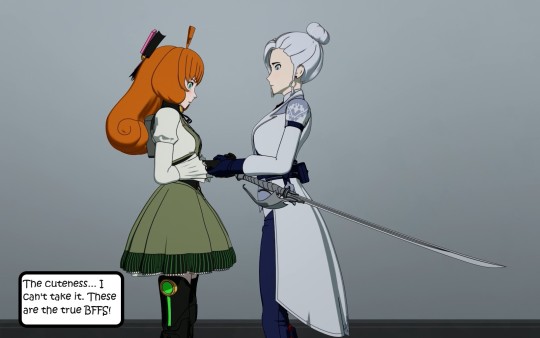
The fights
Although a lot of the “fights” in this volume were done off screen, when there is fighting this volume it has been extremely good. The camera moves around a lot less so we get a better sense of what is going on, and the moves feel more deliberate to whoever is doing the fighting, such as Ruby and Harriet who dart around a lot, delivering only occasional blows (and Ruby taking more of the blows because she’s not as good as Harriet in hand-to-hand), while Yang and Elm go all-out lady brawl (and it’s nice to see Yang’s semblance again)
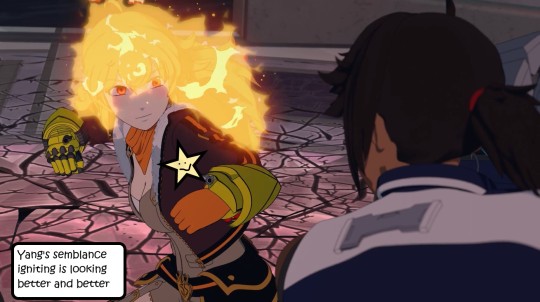
Exception: Weiss.
Weiss’ over-reliance on Summoning is making her boring to watch in fights. Seeing the 300 different ways the animators show her spinning around and waving her sword like a magic wand is getting OLD. If you’re going to have her summon all the time, fine, but stop focusing the camera on her. Just show her very distantly in the background waving her sword/wand and focus on how people fight whatever she summons.
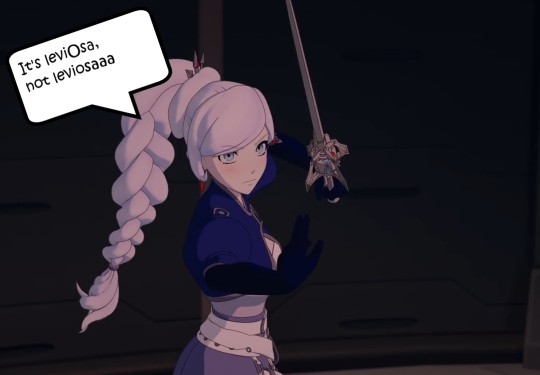
The meh:
RWBY vs Ace Ops- welp… I didn’t think the Ace Ops were gonna lose, I thought RWBY would flee and barely get away because the Ace Ops were supposed to be the best of the best. I guess I’m glad they didn’t just go down like total chumps (except Vine- sorry dude), but apparently if you train with the Ace Ops for 6 weeks, you’re as good as them. *Shrug* Who knew? It’s like Fitness Bootcamp- Train with a soldier on an obstacle course once and you’re basically ready to become a member of Seal Team 6, right?
I wish they would have explained this a little more- maybe looping back to the discussion they had in Episode 4 about being friends vs teammates. Maybe RWBY’s personal bond gives them more incentive to win, while the Ace Ops are just going through the motions because it’s just a job to them. Plus I think Elm and Marrow’s inner conflict also maybe helped tipped the sales towards RWBY, perhaps they weren’t trying their hardest, but I wish this was a little more clear
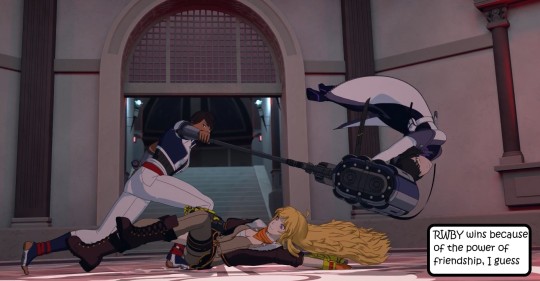
JNPR vs Neo
It’s kind of weird that Neo didn’t incapacitate Oscar, if she was planning to try trapping JNR as well… Or maybe Oscar barely managed to get away? Regardless, Neo had the lamp, so why stick around and wait for more people to show up? The plan was for her to get the lamp FROM Oscar, not necessarily grab Oscar as well. Maybe Neo has her own agenda, which would be cool, but from this episode it looks like she completed her objective but then waited around to fight some more. Maybe getting the lamp was too easy and she likes a challenge...? Who knows (I am saying that a lot for this episode, huh?)
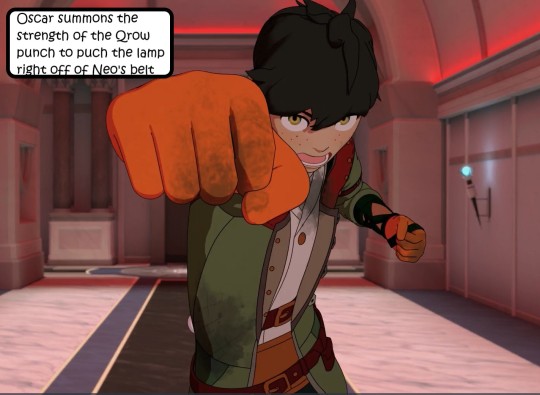
Cinder vs Winter and Penny
This is obviously meh because not much happened, and it’s just set up for the big final fight. With the Ace Ops incap’ed, hopefully RWBY can come in as well to finally fight Cinder directly after dancing around her in V5. I think most of this will go down probably in the Relic room because a grand fight in a cramped hospital room is hard, so I think Cinder will be able to Grimm-snatch the Winter Maiden powers and go down to the relic room, or she will incapacitate whoever does get the powers and drag them there, only to be stopped by RWBY for a big battle. However I don’t think it’ll be Winter Schnee getting the powers since it’ll take too long for the transfer device and they are out of time. I KINDA think now it might be Penny- a girl with an aura/soul- somehow she’ll receive them and it’ll be part of her becoming a real girl (like Pinocchio). Who knows? At this point who gets them is totally up in the air.
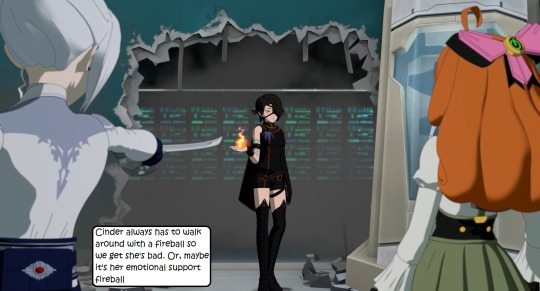
The Ugly:
I guess I was right about Tyrian escaping custody again, but it wasn’t because of Salem intervening with Grimm like I thought. It was because Robyn is a terrible person!
Robyn- Please kindly f- off:
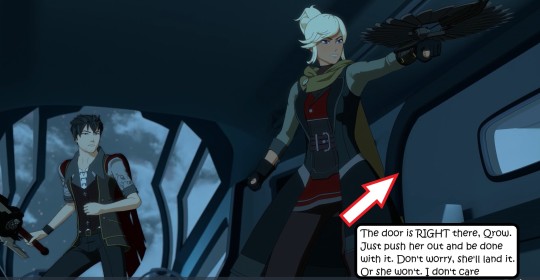
I officially HATE Robyn the most. After teetering on a “meh-leaning-towards-general-dislike” feeling, I loathe her now and I hope she gets killed off quickly. She’s a one-dimensional generic hothead character with no personality that is purposely stuck in to create conflict. She is the good guy’s Tyrian- but Tyrian has a reason to be chaotic: He’s an insane zealot. Robyn is just a poorly written idiot.
Robyn just does stupid things that get in everyone’s way all of the time, and actively works to undermine the hero’s at each turn. She prevented the launch of Amity by stealing all the supplies, and now she is going to try and fight in the middle of a cramped ship, risking Tyrian’s escape rather than waiting 5 minutes to duke it out with Clover once Tyrian is safely in jail. The entire time they were squaring off on the ship I kept thinking “Uhm Tyrian’s right there….Tyrian is RIGHT THERE! He’s gonna get out!” Robyn is a liar. She doesn’t care about the people of Mantle, because she’s doing things that could (and did) lead to a serial killer who killed Mantle Citizens escaping.
Not to mention she could have taken Qrow’s advice and talk to Ironwood first! Literally 2 episodes ago you were saying the General had your support and now you’re like “I’LL FIGHT ANYONE, ANYWHERE. Forget talking to people to get the full details and actually following through upon that trust I claimed I had in Ironwood two episodes ago, I’m gonna risk everyone’s lives to fight this out RIGHT here!” She’s the worst!
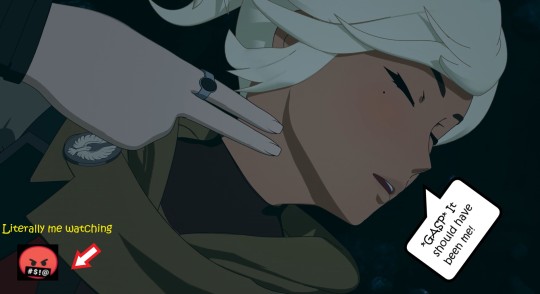
Confrontation with Qrow and Clover-
This falls under the Ugly because, despite some good dialogue between Clover and Qrow, with Qrow expressing that he feels manipulated while Clover tries to explain his own point of view, every decision made from here on Qrow’s part is inexcusable and totally irrational.
Tyrian joins the fray and inexplicably Qrow agrees to team up with him to take down Clover because THAT can’t possibly fail spectacularly.
Tyrian suggests “putting the kid to bed” but the entire time I knew Tyrian would betray Qrow and go too far with attacking Clover because OF COURSE HE WOULD. But I thought he would sting Clover as a chance to get away, because Qrow would have to focus on getting Clover help. However, what we got was…much, much worse.
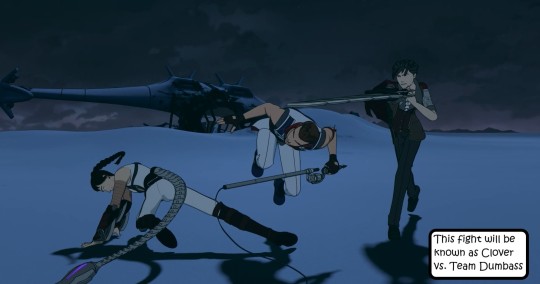
Qrow’s questionable decision making
Hey DUMMY- Why not team up with Clover first to neutralize Tyrian again, and then you and Clover can duke it out. Or you and Clover can go talk to James like you wanted to 10 minutes ago!
Oh right…because “You got a score to settle” with Tyrian because this is now a cheesy western where your ego is more important than logic.
I think his bad luck semblance is really just an idiot semblance- like occasionally his semblance makes him do stupid things, leading to horrible outcomes but he mistakenly chalks it up to “bad luck.” It’s also frustrating because this volume they were setting Qrow up to grow into a good character- someone with a lot of anger from the past who learns to cope with it, and learns to accept friendship from others. I guess that’s all over.
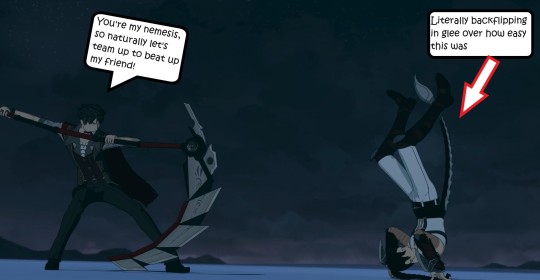
So, sadly, Tyrian then murders Clover. It was shocking I will say that...I actually GASPED, and it led to this really cool shot:
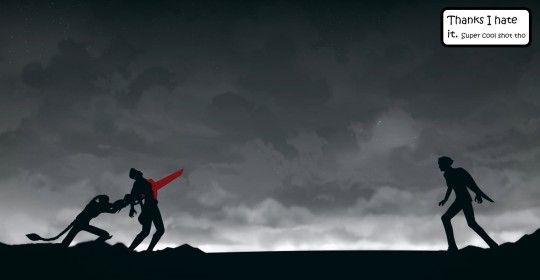
But the shock was partly for the wrong reason. Like I said before, I thought Qrow being a dumb-dumb would lead to Clover being injured, sure, but KILLED? Yikes! Qrow’s idiocy leading to Clover being injured would be frustrating, but not unforgivable narratively and he could learn from it. He would learn to not treat his friends as transactional, and automatically write them off when one hint of struggle happens. Qrow’s idiocy in teaming up with a serial killer and getting Clover killed kinda makes Qrow unforgivable in my book. Does CRWBY want me to hate Qrow? I guess so, especially because Clover’s dying scene didn’t exactly stick the landing and alleviate my anger towards Qrow either....
So poor dying Clover is lying there, and a visibly shaken Qrow kneels next to him. So the thought is Qrow is going to realize his horrible mistake, and dive down a pool of self-loathing: tearfully blaming himself, blaming his bad luck, APOLOGIZING, upset about how it’s all his fault, etc. Instead, he delivers (with a straight face) the weirdest line ever about James taking the fall. UHHH- WUT? You teaming up with Tyrian led to this. WHAT IS HAPPENING?!
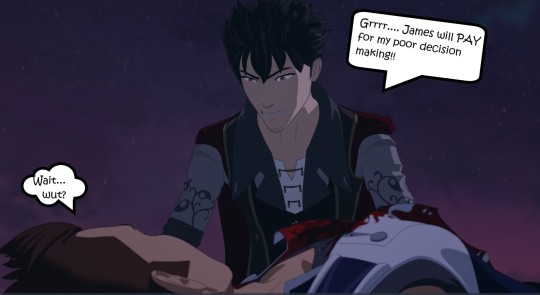
This sucks. On several levels. Clover’s death was just plain poorly done and a good character was wasted. I really liked Clover. I thought Qrow was going to actually get a break from being shit on this entire series and finally get, at a minimum, a friend that would continue to help him grow and develop as a character, pushing Qrow to see the best in himself and stop continually hating himself. With that cut short, I of course felt super sad and emotional about Clover’s death, even to the point of almost crying.
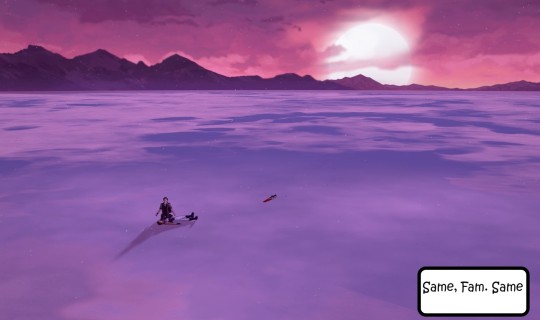
However, I can’t pretend like a significant part of that isn’t pure frustration anger about how this episode played out. Not only did Clover’s death came about in the dumbest way, but his final words with Qrow were wasted by the weird “James will take the fall” bit.
Qrow should have blamed himself and his semblance (I mean...it actually kinda is his fault, not gonna lie), and Clover could have maybe been the ultimate friend to him, telling Qrow that it happened because Qrow was fighting for what he thought was right, and even though the outcome was horrible he shouldn’t stop fighting for what he believes in…? I dunno….ANYTHING other than “GRRR James will pay”
I can’t help but remember a mere few minutes ago.....
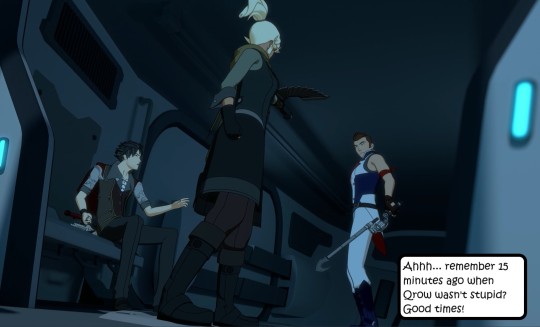
This episode.....woof.
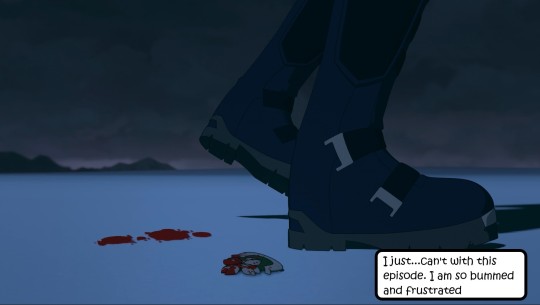
In a long series, you want your hero’s to sometimes lose just to keep it interesting, and to give them something to have to crawl back from. However, what’s interesting is seeing the characters try their best, make reasonable and decent decisions and still suffer a loss, because it makes us want to continue to cheer them on and watch as they make a triumphant comeback. Seeing hero’s simply choke and fail because they make the dumbest, irrational decisions with no logical reason is just frustrating and excruciating to watch, and seeing those moments lead to other characters suffering makes your “hero’s” unlikable.
This argument was made for the V6 climax- that RWBY made a dumb decision and others suffered the consequences, making them “evil” to some hateboner watchers, but I thought this assessment was over dramatic. You have to take things in context, and literally nothing came of RWBY’s decision to steal an airship: the universe was the same as it was before with some filler in the middle. No one was injured or killed, and even the damage to the city was minimal (one roof). Clover, though, is full-on dead and that is entirely Qrow’s fault. I just can’t believe the writers put this down on paper, re-read it, and though- “yea....Someone who totally make the decision to team up with a murderer to subdue their good friend....this is gonna be GREAT.”
But who cares about the story- NEW MERCH DROPPING SOON AMIRITE?!
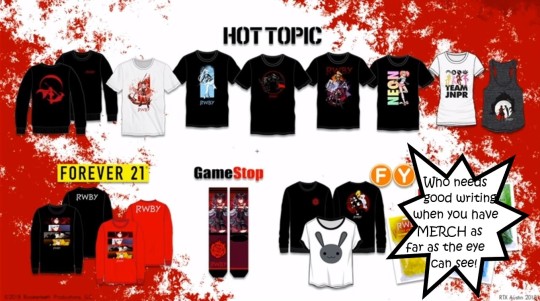
Ok that was a low blow, but the writing and characters inexplicably took a logical nose dive this episode, after having a lot of thought put into last episode. The characters (especially Qrow, but also Robyn and to a lesser extent Clover) could have made some reasonable and logical decisions and Clover still could have died, which would have had way more impact and made the situation seem way more hopeless. Instead we got Robyn kicking off the shitshow by being just the worst, and Qrow taking the shitshow torch and cranking it up to 11, effectively un-doing all of the development we’ve seen from him this season.
Lastly, even if you are going to have the characters completely fail at making decisions and it leads to a horrible outcome, at least stick the landing and don’t have them go off on some odd tangent about how this is someone else’s fault. *facepalm*
Overall I’d give this episode a very generous 2/10.
The 2 points is because of the decent fight animation and occasionally decent dialogue.
I’m tired...
#rwby v7#rwby spoilers#rwby vol7#Robyn Hill#qrow branwen#clover ebi#marrow amin#ruby rose#yang xiao long#blake belladonna#weiss schnee#penny polendina#winter schnee#cinder fall#tyrian callows#rwby salem#oscar pine
19 notes
·
View notes
Text
https://izetarion.tumblr.com/post/189492604696/manpain-is-nothing-more-than-a-sexist-term-meant
See, the problem here is the way that’s gone about it. You can have men showing emotions, which is healthy. But it’s considered manpain if you have to throw others under the bus to give superficial meaning and goals to the male character in-question in order for them to have relevance. And Jaune Arc is a perfect example of what I’m talking about because of his shitty writing which Vomit Knights (aka Jaune Arc stans) defend constantly.
Sure sure, you’re totally not gonna end up talking about female characters indirectly that you would never call out because of gender.
When we learned that Pyrrha Nikos was slated to die for the sake of Jaune’s development in the commentaries by Monty and the rest of CRWBY -
Ruby.
In fact, RUBY has had more development and focus around Pyrrha dying than Jaune.
Not even gonna entertain the rest, the fact that Ruby is pretty much the focal point of the development completely wrecks the rest of the paragraph. No, ‘we never see them being friends’ is not a fucking excuse because both teams are established to be friends with each other.
The entire Jaundice arc is an example of Jaune’s ignorance and manpain because he denied Pyrrha’s help, despite how beneficial it was to him since it stems from the view that he had to do everything himself and he was being very aggressive about it. Yes, he was being bullied by Cardin with the threat of possible expulsion because of forged documents, and Jaune wants to protect his team - but considering the lengths he’s willing to go, wouldn’t it make sense to tell them the truth, instead of just Pyrrha? In the end, Pyrrha helped him in secret using her semblance and opted not to tell him to give a confidence boost. Though I’m glad he apologized to her and she agreed to help him nonetheless.
Yeah, doesn’t manpain refer refer to a man being in pain, NOT arrogance? Seems like all your term has is a negative connotation towards men.
Also, can we get a quote on Jaune’s apology?
Jaune: (turning to her) "Pyrrha... I'm sorry. I was a jerk! You were only trying to be nice, and... I had all this stupid macho stuff in my head-"
Oooo, that’s gotta hurt. knowing that Jaune beat you to the punch.
Pyrrha’s death was used for two things: Jaune’s character development and upgrading his weapons.-
And Ruby’s development...in fact, MORE SO since Jaune’s being getting shafted for three volumes and counting,
The last bit spark much debate in the fandom since the weapons should’ve been returned to her family first and foremost.
Yeah, like a debate between rational people (saying that it doesn’t matter and t5hat she HAD to have more shit with her family) and bigots( who only really cared about ‘fuck Miles I mean Men I mean Jaune’)
And the former is connected to two other characters: Weiss and Cinder. During the fight in Volume 5, when confronted with the killer of his “love interest”, Jaune couldn’t keep his emotions in check and eventually charged in, starting the entire fight between the two groups. Ruby was knocked out by Emerald when she activated her silver eyes when she saw Cinder and Jaune charging at each other - bringing back horrible flashbacks to Pyrrha’s death. Weiss was needlessly impaled by Cinder since Jaune opened his mouth about “his life doesn’t matter as much as theirs”, which caused Cinder to target Weiss in order to make Jaune suffer.
Self destruct in 3...2...1...
This is fucked up because Jaune doesn’t pay any consequences for this; instead, he gets to unlock his semblance. Later in Volume 6, he and Qrow assault Oscar after learning the truth about Salem. He was in his emotions, despite knowing that Oscar is innocent and he’s just Ozpin’s meatsuit. Oscar proceeds to run away and the gang has to look for him.
Yang: *proceeds to do both and gets defended*
OOF, that gunshot really hurts huh? Especially since Yang was more hostile for less of a reason than Jaune.
But hey, she’s the right gender so who cares?
This is especially true since Jaune saved the person he got injuried while Yang had to be saved by the person she got hurt (Blake). FOr not keeping her emotions in check and thinking rationally. For less of a reason because Blake was only STABBED, not KILLED and INDIRECTLY INSULTED.
There is literally no way for you to attack Jaune without attacking Yang.
All of this ignoring how you CAN’T hurt a character who doesn’t give a shit about themselves by hurting them. Shirou Emiya got beaten to shit several dozen times in Fate Stay Night and he never learned his lesson until it started affecting the people around him because, guess what, he didn’t care about himself.
The next part really pissed me off because instead of seeing Oscar’s development and him adjusting to his new role when he ran away, we get ANOTHER scene with Jaune’s manpain about Pyrrha’s death i.e. the statue scene. He meets with a woman that could be Pyrrha’s mother, as she puts flowers on Pyrrha’s statue and talks about how brave and right she was to defend Beacon amongst a few other things, which eventually cheers him up. It’s also around this time that both Ren and Nora tells him that his self-loathing needed to stop (which in all honesty was annoying and needlessly angsty). And then we get whatever scenes happens after with Oscar getting new clothes and learning some type of lesson.
So manpain just means...emotion. So the anon was right.
Because nothing is actually shown to be bad aside from ‘Jaune is sad’. And I know that if Ruby did this you wouldn’t because SHE’S ALREADY DONE IT.
Four characters were thrown under the bus for the sake of Jaune’s development and need to be emotional during times when it didn’t call for it (aka Manpain). Jaune has good and semi-relatable moments, but he’s rarely punished and gets away with A LOT of shit.
They say as they’ve shown Jaune getting punished and ignored the same shit with other character.
Not only that, you think that meeting the person who killed his best friend and saying said dead best friend’s statute is a time not to be emotional? Less so than Ruby making an offhanded mention to Penny or Blake getting stabbed?
Yeah I call bullshit.
Yeah, in this sense, it’s manpain because of the way the character is written in terms of various situations in the story - most of which end up sacrificing another character so he could have his moments.
And yet when female characters do this, you couldn't care less.
Yeah, just keep telling yourself that.
12 notes
·
View notes
Text
Ineffable Inktober-Day Twenty Seven: Wings
Yep, this is me, ignoring the fact that October is over and still working on finishing this....
This takes place a couple of years after the Notpocalypse. And just as a heads up, there are some brief mentions of an injury and pain in this one.
Barriers Broken (AO3 Link)
“Angel? Are you all right?”
Aziraphale started and looked at Crowley with a hasty smile. “Oh yes, everything’s tickety….”
Crowley frowned. “Angel, if you say ‘tickety-boo’, I’ll set your Oscar Wilde’s on fire.”
Aziraphale’s lips formed an ‘o’. “You wouldn’t dare,” he spluttered.
Indignation lit up Aziraphale’s eyes which relieved some of the tension that had been building up inside Crowley. At least the angel could still be offended. That was a comforting sign.
“I might,” Crowley said with a half smirk. “I still haven’t forgiven you for the mess you got us into just so you could get that copy of A House of Pomegranates.”
“That was hardly my fault. No reasonable person would respond to an offer of generous financial compensation with a request for a gun duel.”
“And no sane person would stick around to see what happens after a threat like that.” Crowley sighed and gave him a fond smile. “Come on, angel quit trying to change the subject. You’ve had that look on your face like someone actually managed to worm a book away from you all morning. What’s wrong?”
It wasn’t just the expression on Aziraphale’s face that had Crowley worried. There was also pallor the angel had and the way his features were pinched with pain. Aziraphale’s step had been sluggish and punctuated with the occasional stumble. Now, beads of sweat were appearing on the angel’s forehead, and Crowley refused to put his questions off any longer.
Aziraphale shook his head and pulled a small handkerchief that had embroidered golden wings on the corners out of his pocket. He wiped his forehead with it and frowned when he pulled it away from his face.
“I, I’m afraid I might have to make an appointment to visit Heaven soon. And I’m really not looking forward to it.”
Crowley let out a huge breath. Neither of them visited their former head offices in the two years since they had been released after the Nearpocalypse. Although he never said a word about it, Crowley was certain that Aziraphale dearly wanted to avoid Heaven.
However, if the angel was truly ill, a visit to Heaven might be necessary. The fact that Aziraphale was considering it meant that, whatever this was, it was serious.
“Why?” Crowley asked. He hadn’t meant for that to come out as an accusation, but the worry that had frayed his nerves had also stretched his vocal cords past sounding casual or simply concerned.
“I….” Aziraphale cast his eyes downward. “It’s my wings. I think there is something wrong with them.”
At that moment, Crowley was grateful for the sunglasses on his face because he doubted that he could hide the terror that was sure to widening his eyes. While their wings were usually kept out of the physical plane, that didn’t meant that they could be ignored or that they couldn’t be injured.
Even worse, because an angel and a demon’s wings were so intertwined with their True Self, a severe injury or a minor one that was neglected could spread to the rest of the non-corporeal form. And if that was allowed to happen…it meant a death as sure and as permanent as one delivered with holy water or Hellfire.
“What happened?” Crowley said, his voice morphing into a low growl.
“I…there was a demon who visited the shop a couple of weeks ago,” Aziraphale replied. “They was looking for you. But after I refused to tell them anything, I suppose they decided to get rid of me before continuing their search.”
Crowley’s hands curled into fists, his jaw tightening. “I warned them. Looks like I’ll have to….”
“No, not really,” Aziraphale said, holding up a hand. “I already Smote them. Quite decisively too. They won’t be back for a long while. But I’m afraid they did manage to land a nasty gash to my right wing before I dispatched it. I, I thought I could take care of it on my own….”
“Open your wings,” Crowley cut in. Aziraphale took a step back from him, and Crowley struggled to ignore the twist in his heart at the sight. “Look, I’m not going to do anything to them unless you want me to, but we got to see how bad the damage is, right? So please, angel. For me?”
That last part was blackmail, and Crowley knew it, but he was too worried to focus on that right now. He would deal with the repercussions of that later when he knew that Aziraphale was going to be all right.
The angel ducked his head and nodded. Slowly, he pulled his wings out of the celestial plane and into the physical one. Once they were fully out, Crowley did another sharp intake of breath.
Aziraphale’s wings were beautiful, but they were also horribly messy, full of broken and disheveled feathers and what looked like a molt that hadn’t been completely cleared away. Worst of all though, was a long slash in the upper part of the right wing. The wound was scarlet through the fluff of sparse feathers that stuck to it and it was trickling stray drips of a green ooze.
“Aziraphale,” he breathed. “This…this is….”
“Crowley…I’m, I’m afraid that I….”
The angel put his hand to his forehead again, his eyelids fluttering and his posture wavering. Crowley immediately took the hint and rushed over just in time to catch him before Aziraphale fell face first onto the floor.
‘Shit! Shit, shit, shit...!’ “Hey, I’ve got you,” Crowley said, struggling to sound reassuring. “Ok, I’ve got you. Can you walk? Angel? Hey, can you hear me?”
Aziraphale didn’t respond. His head flopped onto Crowley’s shoulder, and the demon didn’t have to see his face to know that Aziraphale was likely unconscious by now. Deciding not to waste any more time on conversation, Crowley hoisted Aziraphale over his shoulder, the angel’s wings draped around him like a shroud.
“It’s ok,” Crowley babbled. “It’ll be all right. We’ll get you fixed up and it’ll be fine. Just hold on, Aziraphale, ok? I’ve got you.”
He continued the steady stream of comforting nonsense while using a miracle to move both of them to the bedroom and as he lowered Aziraphale onto the bed. A bed which suddenly became much larger and wider to accommodate the wings and both of them being on it. Crowley snapped his fingers to brighten the light in the room, because despite the discomfort it would cause, he needed to be able to see even the smallest details of what he was doing.
Crowley ripped the sunglasses off his face and tossed them aside as he climbed onto the bed. He turned Aziraphale face down so he could examine the wing from a better angle.
‘Don’t think it has spread through the whole wing yet. So at least there’s that. Hard to tell though with how they look right now….’
Crowley frowned. It was obvious that the angel hadn’t taken care of his wings at all and the neglect had exacerbated the trauma of the wound. He was going to have a talk with Aziraphale about this when the angel woke up, but for now, he needed to focus on the bigger problem at hand.
“Angel, if you can hear me, I’m going to treat your wound, all right? So, I’m going to have to touch you and….”
That got a response, but not one Crowley had hoped for. Aziraphale’s wings trembled, curling away from him and there was a pained whimper. Whispers laced with shame and agony.
“Please…please don’t, Crowley…please….”
‘Damn him.’ Crowley’s eyes stung. To do nothing would mean death, and he already knew which he would prefer if he had to decide between Aziraphale loathing him and Aziraphale not existing.
“Aziraphale,” he said, his voice deliberately stern. “If I don’t take care of this…you know what will happen. I’m sorry, I know you don’t want me to do this, but…ngk….”
He could have said more. He was a tempter, and damn good at his job. He should have been able to find the words to convince Aziraphale, but words could break through the hurt he felt at the husky sob he heard from the angel.
‘Please,’ Crowley’s heart cried out. ‘Please, Aziraphale…’
Slowly, awkwardly, Aziraphale’s wings stretched out again, still trembling, but steady enough so that Crowley could work.
‘Right….’ Crowley snapped his fingers and a stack of soft, green towels appeared on the stand next to the bed. Another snap and some tonics he had stored at his flat sat next to them.
There was so much Crowley wanted to do to Aziraphale’s wings. Not just heal them, but fix them. Straighten and clean them so that they could be as beautiful as Crowley remembered them being in Eden. But doing more than what was necessary to save Aziraphale’s life would be a violation of trust at this point. As much as he burned to do more, he swore to himself he would make this quick.
Crowley looked through his tonics, chose one, and sprinkled a tiny pool of it onto his hand. “Ok, this will sting a little, but I promise it will help, ok?”
There was no response, but Crowley knew better than to assume that Aziraphale hadn’t heard him. More likely, the angel just shut himself down to conserve his strength and as a way to cope with what was coming. But Aziraphale was probably still aware, and Crowley made sure that that remained at the forefront of his brain throughout this.
Gingerly, he rubbed the tonic into the wound. Aziraphale moaned and shuddered, but did not open his eyes or make any other sound. Crowley rubbed the excess away with one of the towels, mopping up the green goo that had congealed on the nearby feathers.
Crowley took a deep breath. “Ok, this is going to be the worst of it. But I’m going to make this as fast as possible, I promise.”
There was still no reply from the inert form on the bed. Crowley slowly blinked and then placed his hands on either side of the wound. A harsh cry rang out, and Crowley almost let go. But then he reminded himself that this was coming and held on.
Then he closed his eyes and focused everything into drawing out the poison and repairing the damaged flesh. The poison turned his stomach. The knitting of soft tissue drained him. But Crowley was sure that none of it could compare to how dreadful Aziraphale felt right now.
Once he was certain that the wound was purified and healed, Crowley let go, releasing a long sigh as he did. Aziraphale was completely out, boneless, his wings drooping over the sides of the bed.
Crowley scooted to the foot of the bed, lying down and curling into a ball on his side. He wanted to be there when Aziraphale woke up. He told himself it was just to make sure that Aziraphale was going to recover.
It hurt too much to acknowledge that it was also because he couldn’t bear the thought of Aziraphale being alone after all that.
#good omens#fanfic#My fic#ineffableinktober#dang it I'm going to finish this challenge...even if it takes another month...XD
16 notes
·
View notes
Text
Suede
SKY magazine, December 1993
written by Simon Witter
"HELLO! WHAT HAVE WE GOT HERE?!" asks Brett Anderson rhetorically, staring at the fluff he has just removed from his ear. "I haven't taken these earrings off for about nine years."
It may seem an incongruous moment to ask the 27-year-old indie pin-up about his personal style, but hey, that's the kind of guy I am. "Tatty," replies Brett with a wry smile. "I haven't been able to get out and go shopping."
Brett Anderson, frontman of Suede – the British pop sensation of 93 – is hotly rumoured to have a great dress sense. Today however, perched uncomfortably behind an executive desk at the central London HQ of his record company, his head inadvertently framed by a halo of Right Said Fred promotional balloons, he is sporting a navy blue jeans'n'top ensemble he accurately describes as "just anything". Brett has been telling me how he spends most of his time with people who work in shops or are unemployed – "real people, not in the business" – so I presume this boutique bonding provides a clue to his supposed, though temporarily non-evident, style savvy.
"Oh no," he gasps. "Not clothes shops! Most of my friends are in food shops. So I know a good bit of brie when I see it."
The thought of Brett Anderson having, at any point in his life, ever eaten food, conjures images of pigs flapping their trotters as they sail past this second floor window. But we press on with the personal style enquiry.
"I want to change it at the moment," he says. "I'm sick of wearing second-hand things. I used to have a grudge against new clothes because I don't like wearing things that another thousand people are wearing. It's nothing to do with being into clothes from years ago, or tatty clothes at all. I'm quite keen to toy around with my style until I eventually find something, to have clothes made for me. There's never anything, when I go out and look for clothes, that I really love. I've got quite a strong vision of what I want, which would be very, very well fitted things. I don't like baggy things. I like lots of ethnic looks. I really like the Spanish look, that sort of matador thing." By way of explanation, Brett strikes a pose, clicking imaginary castanets above his head. "I like that shape. Prince wears a really brilliant little thing sometimes. When I kept getting my bellybutton out, it was really a desire to achieve that shape more than anything, nothing to do with flaunting my navel."
It's well worth flashing your bellybutton while you still can, I assure him, a rueful hand on my own expanding waistline.
"Yep," he smiles. "Well I can't anymore. Not after that chinese last night."
In May of 1992 Suede released their first single, 'The Drowners'. They had already been on the cover of Melody Maker – before they had a record out – and would grace 18 other British magazine covers over the next year, including the cover of Q on just their second single. Their eponymous debut album, released last March, went straight to No. One in the charts and went on to win the Mercury Prize, and last autumn they released a full-length concert video Love & Poison. At this rate, it will be time for their memoirs by easter.
Within the bizarre, incestuous fishbowl of the British music media, Suede have become almost self-damagingly important. After a couple of wilderness years spent faffing about, finding their feet and being universally loathed, their overnight transformation into the most hyped band in the world was nothing short of miraculous. Yet it created impossibly high expectations of their music. A German friend told me how surprised he was, after long distance exposure to their media glare, to discover how average Suede sounded – a judgment that casual discovery of the first album would hardly have elicited. And while touring America, their support act the Cranberries famously outshone them by an enormous factor when it came to album sales. Yet phase one of Suede's career has been – or appeared to be – so extraordinary, that they are going to be hard-pressed to follow it up with anything similarly momentous.
For now, we have 'Stay Together', a new, epically long single. As a measure of Suede's magnitude in the reality-starved world of British indie pop, I am treated to an absurd preview of the track the day before meeting Brett. Before entering the listening room I am subjected to a bag search to check – I kid you not! – that I'm not carrying a concealed tape recorder.
In LA, the world capital of muso control freakism, I was played U2's Desire, the immediate-follow up to their 15-million selling Joshua Tree album, eons before its release without anyone thinking twice. Yet now, without a hint of humour or irony, I am being treated as if I not only know anyone who cares what the next Suede single sounds like, but would be willing to pay for a tape of it recorded through a leather bag.
After regaining consciousness, I join in the fiasco, insist on a full body search (well, at less reputable establishments you'd have to pay good money for this touchy-feely experience) and am seated. The label boss places two speakers on each side of my head, facing my ears from about 20" away, turns it up LOUD, and begins to do that embarrassing, pseudo appreciative in-chair grooving that only people who work in record companies and recording studios have the gall to indulge in. "It's not pompous," he assures me, "even though it's eight minutes long."
Of course any pop song – as opposed to dance record – that lasts eight minutes is by definition pompous. 'Bohemian Rhapsody' was gloriously, defiantly pompous with a side order of pomposity to go. But, despite the circumstances, 'Stay Together' sounds like a fine, many-hued song, liberally doused with Bernard Butler's life-saving guitar, that is destined neither to win many new fans nor shock the devotees.
"It's about a sense of unrest I feel about the world," Brett tells me the following day, in an ill-advised shot at an explanation. "An attempt to make some sense when everything seems to be going slightly insane. I do get a real sense of impending doom, but not in a depressing way, not like we're all gonna die, let's go and rape people. I feel quite content with it. We're living under some shadow, and I'm not quite sure what it is. It's a bit like the fears I felt when I was growing up, when things were unstable and there was the threat of nuclear war, or the fear that your parents could die of aerosol poisoning."
Brett grew up, together with Suede drummer Mat Osman, in the soulless satellite town of Haywards Heath, between London and Brighton. According to Osman, if they'd been the tea party fops people make them out to be, they would've formed a grunge band. They only wanted to be really glamorous because of their stultifyingly dull working class backgrounds. Some might say that that would lead to the three-Es-a-night, dance-and-forget syndrome, rather than the formation of a glam rock band.
"Hopefully we're not a glam rock band," Brett shudders defensively. "You can escape those surroundings by taking a load of Es and ignoring it. Another way is to create your own myth, to try and become romantic in your own eyes, to create something beautiful out of the rubbish and the shit. It all sounds very Oscar Wilde, but that's the way we did it. None of us were brought up in workhouses, but we haven't had easy lives at all."
Suede claim to be obsessed with fame because they were excluded from it. Yet surely fame is the one classless thing people aren't born into?
"Lots of people are constantly privileged," says Brett, who has clearly spent an unhealthy amount of time pondering the abstract qualities of fame. "If you're born in Soho to rich professional parents, and you've got Jonathan Wotsisname coming round to your house every night to see your father, then you've got this world that you slip easily into. When you're excluded from it there's a desperation, you're desperate to have it. It doesn't come as second nature to you, like professionally famous people who hang out in Beverly Hills. It's not something you're comfortable with, but that mutates it into something far more interesting, a bit prickly and far more creative, because you're not just sitting there lapping it up."
Suede's appearance coincided not unfortunately with the post-Madchester 70s revival. But was their styling something more than just the result of being unable to afford new clothes? Personally, I had thought the emergence of Gary Numan had killed off the idea of anyone ever again wanting to be David Bowie (not to mention Bowie's recent records). Then along came Suede, with their rough guitars, their androgyny and their theatrical singer.
"I never thought of ourselves as '70s," Brett insists. "David Bowie is a genius, but the rest of all that rubbish I always found laughable. As for the clothes, I always thought we looked more 60s than 70s. It's all tied up with this whole kitsch thing, this Magpie and Porridge and rediscovering the culture of British music journalists' youths. Kids of 14 didn't know what anyone was talking about, it was just that the people in power had reached a certain age where they were getting sentimental about their youth and started remembering Magpie. That's all it was, all a complete load of rubbish. As soon as we were aware that this scene was going on, we wanted nothing to do with it."
Brett's voice is a highly variable instrument, perfect and beautiful on slow numbers like 'The Next Life', but occasionally, when he affects that archly operatic Bowie yodel, a whiney, sneering sound like Rik Mayall on speed boring into your brain – absolutely maddening. It goes without saying that his delivery owes much to the most overrated British pop star of the last decade, Morrissey.
"I forced my voice in that way because of how we were born, musically, playing shitholes. It was the only way I could make myself heard. I didn't want to sing in the murmuring way that was the style of the time. I wanted to project my voice, because I was writing songs that I wanted people to hear the words of. I wasn't just writing about fluffy little clouds, which is what everyone was doing at the time. People read into my intonations a theatrical seventiesness, but it was a complete accident."
Overworked as the subject is, it's hard to avoid asking why Brett thinks his androgyny caused such a fuss. It's not the first time it has been done; it's not even the tenth time. Genderless, mincing fops are to classic British pop what hairspray is to American rock, a staple ingredient. Brett, by comparison to most, is pretty tame.
"I don't know," he sighs. "We certainly weren't thinking 'oh let's be androgynous', it's just the way we are. I'm naturally quite an effeminate person – not all the time, I do play on things. I think it was because, at the time, people were so incredibly boring. We had been through five years of the cult of non-personality, and we never wanted to go with the flow. When everyone had their heads down, chugging away, we wanted to twist things a little bit. It's like at school, when you find that something annoys someone, you keep on doing it more and more. And that's what happened really."
A female psychologist wrote recently about the overt sexual expression of pre-pubertal girls at pop concerts, the way in which, amidst the non-contact hysteria of the pop experience, they could sometimes experience their first orgasm. She was, admittedly, talking about a Take That show, but I can't help wondering if it looks like that from the stage to Brett Anderson?
"No, nothing like that," he purrs, "nothing sexual. I always feel like people are putting it on."
Having their first fake orgasm?
"It's a bizarre thing in my head. I know they really like me, but I can't really take it seriously. When I'm onstage, and it's working, I feel like I can do absolutely anything. I feel as though there's no limit, even in the sense that I could fall asleep if I felt like it, because I'm that relaxed. I feel much more comfortable on stage than walking down the street. I could go off into a corner and do a crossword or shave my head. I feel ridiculously relaxed. I really enjoy the power of being onstage. It's to do with the circuit of the flow between the audience and you, when it's an audience willing you to be good. Your own power is an expression of how the audience is feeling, but I can't say I ever feel sexual, even if it looks that way. I think that to call the power purely sexual is to belittle it. When I've been to incredible gigs, it hasn't been a sexual thing, it has been something far more magical than that. "
Brett and Osman came to London in the mid 80s to study, respectively, architecture and politics at UCL and LSE. Suede began after they placed an ad in the NME in 1989, but initial concerts had audiences shouting "Fuck off!", critics calling them effete wankers and record companies running for the hills - a three-pronged invitation to eat shit and die that would have spelt the end for most bands.
"That X factor that made people despise us," muses Brett, "was something we managed to turn around in our favour. It's like being in love with someone, and exactly the same things you adore about them, completely horrify you when you've fallen out of love. We went away and learnt how to write songs, and came back transformed. And those qualities that originally pissed people off, we transformed into something provocative. I think the fact that we went through all that rubbish was a fucking good thing for us. People forget that the Beatles spent five years in Hamburg. No one would touch them in England, cos everyone thought they were an utter load of shit. They spent five years getting it together, suffering a bit and fighting for it."
A typical lyric from those hard years was Brett's line about "shitting paracetomol on the escalator". When they were recently described as chemically saturated, I had assumed more interesting chemicals were involved.
"That's about pure mundanity, being off your face every night and your staple diet coming from your bathroom cabinet. It's a metaphor for a humdrum life, going up and down the London underground, which I spent five years of my life doing."
In many ways this – Suede's poignant soundtracking of new depression Britain – is their strength. But if they are Her Majesty's equivalent of slackers, it hasn't made America any more amenable to their cause. Indeed, despite Brett's avowed loathing of the British character – "negativity, small-mindedness, lack of faith" – there may well be a Britishness about Suede which prevents America from getting the point.
Brett makes the mistake of quoting a Smiths song to me – something about innocence, fragility and trust – forcing me to point out that American audiences don't want to be trusted with something precious, they want to rock out with their cocks out. Evan Dando may wear a dress and pigtails, but the wider American market is notoriously unkeen on sexual ambiguity. Queen were big in America until the early 80s, when Freddie Mercury started appearing in full clone gear. They never toured America again, and didn't have a single hit until after his death (and then only thanks to Wayne's World). In fact, America's association of guitars and manliness make Suede fundamentally unsuited.
"No!" storms Brett. "I don't think we're fundamentally unmanly. All you have to do is come and watch us live. We're about sexuality, power and emotion, things that everybody feels."
Whether or not America is destined to fall for his Morrissey-meets-Larry Grayson stage persona, Brett's much-aired desire to move to America (and less well-known plan to live in Paris) has, for now, been replaced by a much smaller act of bedouinism.
"I've moved from Notting Hill to Highgate," he announces proudly, "from a fashionable place to a place where you're living in the last century pretty much. I was living in a very small flat in Notting Hill and it was driving me insane, I couldn't write and was being bombarded with nonsense all day long. I needed the peace and quiet, and now I have a bigger flat with a studio room in it and I'm writing quite prolifically. It's more serene, there's more space to think. It's quite a beautiful place, but you do feel like you're living in the last century, like you're some sort of oddity, or in a play. You keep going into these odd characters. But it's a great place."
In person, and despite the affectation of much of his thought processes, Brett Anderson is quite charming. An endearing smile – which seems to hibernate when cameras are around – plays constantly around his face, suggesting shared confidences which, to some extent, he delivers. Like so many people cocooned by over-protective minions, he is refreshingly open and approachable. I like him. But he is deeply shocked and incredulous when I paint a picture of the special treatment afforded him by those he works with.
"They treat me with the respect I deserve," he jokes defensively. "I don't have tea with Lenny Kravitz. My best friend works in a chip shop, and that's why I like it, it's a complete escape. One of the beautiful things about being successful is that it can rub off onto your friends as well. Not fame and all that bullshit – the really brilliant thing about being successful is the self-confidence, the sense of life having a purpose, that life is a wonderful thing. You open the shutters in the morning and the sunshine pours through. That sense of vitality about life can completely rub off on your friends. Sometimes it doesn't, it can go the other way, with friends ignoring you cos they think you don't have time for them, but that never happens with your proper friends."
And yet, engulfed in the sweltering perversity of his peer group, Brett has come to hold some pretty crap views, views that seem utterly irrelevant beyond the borders of saddo indie land. He worries about being thought a sell-out, thinks Suede are radically honest because they admit to having ambition – as if people didn't get over all that bollocks a decade ago – and, worst of all, that people don't talk enough about music in interviews. Oh dear!
But, despite all this, Brett's public image remains unshatterably cool. He exudes waves of sultry, sulky hipness. I feel an urge to know what naff items lurk in the corners of Chateau Anderson, his ownership of which will shock Suede devotees to the core. Brett tells me he's been to see Aladdin, listens to jazz music, likes The Orb and Verve and has just bought the new Shamen single. To prove it, he even does his Mr C impression - "Comin' on like a vibe, y'know!". This won't do at all.
"I like Terence Trent D'Arby," he admits, trying harder. "I think he's really good."
It's good, but it's not right.
"I bought Billy Joel's River Of Dreams album. I like that one."
Aha – as Inspector Clouseau used to say – now we are getting somewhere! What about films?
"No, I've got impeccable taste when it comes to films."
No feature length On The Buses video stashed chez Brett?
"No. I have got Crocodile Dundee."
Bingo and Bullseye! So much for impeccable taste.
"Well, my perennial favourite is Performance," he flusters wildly. "I can virtually quote the whole film from start to finish. And there's a brilliant film which I've just discovered called The Shout, with John Hurt, Alan Bates and Susanna York. It's about a man who has spent years in the Australian bush learning the secrets of the bush doctors coming to this ridiculously reserved Cornish village and turning two people's lives upside down. It's like an animal alive within this village, and when he shouts, everyone within a mile radius dies. If Alan Bates' part had been played by Vincent Price, it would've been laughable, but it's incredibly powerful, one of those great lost films."
It's a nice try, but nothing can erase the impression created by Billy Joel and Crocodile Dundee.
28 notes
·
View notes
Photo
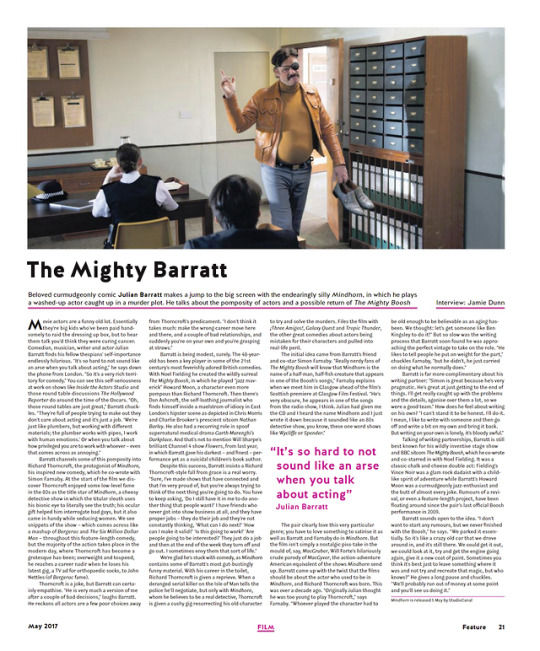
The Skinny Magazine
Published on May 01, 2017
[ View larger version here ]
Text from the article can be read below. (There may be some errors.)
The Mighty Barratt
Beloved curmudgeonly comic Julian Barratt makes a jump to the big screen with the endearingly silly Mindhorn, in which he plays a washed-up actor caught up in a murder plot. He talks about the pomposity of actors and a possible return of The Mighty Boosh
Interview: Jamie Dunn
Movie actors are a funny old lot. Essentially they're big kids who've been paid handsomely to raid the dressing up box, but to hear them talk you'd think they were curing cancer. Comedian, musician, writer and actor Julian Barratt finds his fellow thespians' self-importance endlessly hilarious. "It’s so hard to not sound like an arse when you talk about acting,” he says down the phone from London. “So it's a very rich territory for comedy.” You can see this self-seriousness at work on shows like Inside the Actors Studio and those round table discussions The Hollywood Reporter do around the time of the Oscars. “Oh, those round tables are just great,” Barratt chuckles. “They're full of people trying to make out they don't care about acting and it’s just a job. ‘We're just like plumbers, but working with different materials; the plumber works with pipes, I work with human emotions.' Or when you talk about how privileged you are to work with whoever - even that comes across as annoying."
Barratt channels some of this pomposity into Richard Thorncroft, the protagonist of Mindhorn, his inspired new comedy, which he co-wrote with Simon Farnaby. At the start of the film we discover Thorncroft enjoyed some low-level fame in the 80s as the title star of Mindhorn, a cheesy detective show in which the titular sleuth uses his bionic eye to literally see the truth; his ocular gift helped him interrogate bad guys, but it also came in handy while seducing women. We see snippets of the show - which comes across like a mashup of Bergerac and The Six Million Dollar Man - throughout this feature-length comedy, but the majority of the action takes place in the modern day, where Thorncroft has become a grotesque has-been; overweight and toupeed, he reaches a career nadir when he loses his latest gig, a TV ad for orthopaedic socks, to John Nettles (of Bergerac fame).
Thorncroft is a joke, but Barratt can certainly empathise. “He is very much a version of me after a couple of bad decisions,” laughs Barratt. He reckons at actors are a few poor choices away from Thorncroft’s predicament. "I don't think it takes much: make the wrong career move here and there, and a couple of bad relationships, and suddenly you're on your own and you're grasping at straws.”
Barratt is being modest, surely. The 48-year-old has been a key player in some of the 21st century's most feverishly adored British comedies. With Noel Fielding he created the wildly surreal The Mighty Boosh, in which he played “jazz maverick” Howard Moon, a character even more pompous than Richard Thorncroft. Then there’s Dan Ashcroft, the self-loathing journalist who finds himself inside a maelstrom of idiocy in East London's hipster scene as depicted in Chris Morris and Charlie Brooker’s prescient sitcom Nathan Barley. He also had a recurring role in spoof supernatural medical drama Garth Marenghi’s Darkplace. And that’s not to mention Will Sharpe's brilliant Channel 4 show Flowers, from last year, in which Barratt gave his darkest- and finest- performance yet as a suicidal children’s book author.
Despite this success, Barratt insists a Richard Thorncroft-style fall from grace is a real worry. “Sure, I've made shows that have connected and that I'm very proud of, but you're always trying to think of the next thing you're going to do. You have to keep asking, 'Do I still have it in me to do another thing that people want?' I have friends who never got into show business at all, and they have proper jobs - they do their job and they're not constantly thinking, 'What can I do next?' 'How can I make it valid?’ ‘Is this going to work?’ 'Are people going to be interested?’ They just do a job and then at the end of the week they turn off and go out. I sometimes envy them that sort of life.”
We're glad he's stuck with comedy, as Mindhorn contains some of Barratt's most gut-bustingly funny material. With his career in the toilet, Richard Thorncroft is given a reprieve. When a deranged serial killer on the Isle of Man tells the police he’ll negotiate, but only with Mindhorn, whom he believes to be a real detective, Thorncroft is given a cushy gig resurrecting his old character to try and solve the murders. Files the film with ¡Three Amigos!, Galaxy Quest and Tropic Thunder, the other great comedies about actors being mistaken for their characters and pulled into real-life peril. The initial idea came from Barratt’s friend and co-star Simon Farnaby. “Really nerdy fans of The Mighty Boosh will know that Mindhorn is the name of a half-man, half-fish creature that appears in one of the Boosh's songs,” Farnaby explains when we meet him in Glasgow ahead of the film’s Scottish premiere at Glasgow Film Festival. “He's very obscure, he appears in one of the songs from the radio show, I think. Julian had given me the CD and I heard the name Mindhorn and I just wrote it down because it sounded like an 80s detective show, you know, these one word shows like Wycliffe or Spender.”
The pair clearly love this very particular genre; you have to love something to satirise it as well as Barratt and Farnaby do in Mindhorn. But the film isn't simply a nostalgic piss-take in the mould of, say, MacGruber, Will Forte’s hilariously crude parody of MacGyver, the action-adventure American equivalent of the shows Mindhorn send up. Barratt came up with the twist that the films should be about the actor who used to be in Mindhorn, and Richard Thorncroft was born. This was over a decade ago. "Originally Julian thought he was too young to play Thorncroft,” says Farnaby. “Whoever played the character had to be old enough to be believable as an aging has-been. We thought: let's get someone like Ben Kingsley to do it!” But so slow was the writing process that Barratt soon found he was approaching the perfect vintage to take on the role. “He likes to tell people he put on weight for the part,” chuckles Farnaby, “but he didn't, he just carried on doing what he normally does.”
Barratt is far more complimentary about his writing partner: "Simon is great because he's very pragmatic. He's great at just getting to the end of things. I'll get really caught up with the problems and the details, agonise over them a lot, so we were a good team." How does he feel about writing on his own?” "I can’t stand it to be honest. I'll do it. I mean, I like to write with someone and then go off and write a bit on my own and bring it back. But writing on your own is lonely, it’s bloody awful."
Talking of writing partnerships, Barratt is still best known for his wildly inventive stage show and BBC sitcom The Mighty Boosh, which he co-wrote and co-starred in with Noel Fielding. It was a classic chalk and cheese double act: Fielding's Vince Noir was a glam rock dadaist with a child-like spirit of adventure while Barratt’s Howard Moon was a curmudgeonly jazz-enthusiast and the butt of almost every joke. Rumours of a revival, or even a feature-length project, have been floating around since the pair's last official Boosh performance in 2009.
Barratt sounds open to the idea. "I don’t want to start any rumours, but we never finished with the Boosh," he says. "We parked it essentially. So it's like a crazy old car that we drove around in, and it’s still there. We could get it out, we could look at it, try and get the engine going again, give it a new coat of paint. Sometimes you think it’s best just to leave something where it was and not try and recreate that magic, but who knows?" He gives a long pause and chuckles. 'We'll probably run out of money at some point and you'll see us doing it.”
55 notes
·
View notes
Text
THE WAY BACK FILM REVIEW

The Way Back, directed by Gavin O’Connor, follows Jack Cunningham (Ben Affleck) an alcoholic who is asked to step in as the new head coach of the current, failing basketball team at his alma mater. As he gets the team to shine though, he falls further into the hole that he has dug himself into.
This is very much not a film that most people will say that they were extremely excited for. This is no blockbuster nor does it boast a particularly ground-breaking story, but the talent both in front and behind the camera is great, so that’s what is exciting about this film. I personally loved O’Connor and Affleck’s previous outing together, The Accountant, and I truly think Affleck is an underrated actor. He gets a lot of guff still for his roles in the early 2000s, but that time has long since shown that he can truly act. Honestly, if this film had come out later in the year, it really feels like it could’ve been a real Oscar contender, and maybe it still will be.
Basically, this film is a better version of Coach Carter combined with the addiction elements of A Star is Born. It’s quite run of the mill narratively speaking and doesn’t do much new with the story being told. However, the filmmakers excel at telling this story in their own way, forcing you to adjust to the unique way that the story is presented.
The uniqueness comes in three forms, the direction, the editing, and the camerawork. Starting out with the direction, O’Connor does something that films like this don’t normally do, he allows the story to breathe. There’s so much going on in this film, but O’Connor never forgets to allow for moments to breathe in the midst of Jack’s chaotic life. O’Connor forces you to sit with Jack’s decisions and destructive choices, making the audience confront them, even as Jack refuses to.
As for the editing, so much of the film feels disjointed. In most films, this would be a very, very bad thing, but, after a bit, the editing suddenly begins to feel like drunken blackouts. One moment, you’re in one place, the next you’re in another, with no memory of how you got there. It’s a subtle thing that allows you to get inside of Jack’s headspace that will throw some viewers off, but still effectively creates a new disorienting sense of the film.
As for the camerawork, it’s extremely well shot during the basketball sequences and it makes you feel like you’re on the court. But it’s at it’s best in the intimate moments of the film. There’s a handheld technique used here that allows for just enough stabilization of the camera to make you feel uneasy. It’s like the camera knows that Jack can fly off the handle at any moment and, as such, is ready to jump out of the way. It’s extremely subtle, but incredibly effective.
Ben Affleck carries the weight of this film though. Everything lies on his performance here and he gives one of the best of his career. It’s hard to say how much is a performance though and how much is just him reliving memories given his very public struggles, but that doesn’t matter. Affleck carries the pain, hurt, and self-loathing of Jack and delivers an incredibly vulnerable performance that is charismatic enough for you to root for, but just unsympathetic enough to where you want to yell at him. It’s a fine line and Affleck nails it.
The supporting cast, especially Janina Gavankar and Al Madrigal, are great as well. They both play off Affleck in drastically different ways, but exactly how the film needs them to be at that point. They are subtle performances, but ones that enhance everything around them.
The Way Back is a heartbreaking story of addiction and loss, wrapped around the facet of a great high school sports film.
9.0/10
Thanks for reading!
1 note
·
View note
Text
Rocketman
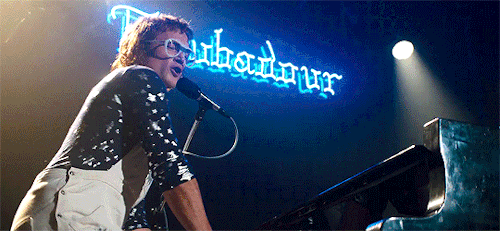
If you remember my Robin Hood review, you probably know that I would let Taron Egerton walk across my face in those kicky high-heeled boots up there and say “thank you” so you might think that my assessment of Rocketman, the new musical biopic in which he stars as Elton John, is a bit skewed. And I’d agree with you - I’m such a huge fan of Taron’s that it was definitely difficult for me to fully immerse myself in him playing this other real person (whom I’m also a fan of). And that disconnect, that slight gap between the layers of identity, should ruin everything - but instead, it created the most moving, fantastical, ambitious, heartbreaking biopic I’ve ever seen. How? Well...
The simple answer - because it’s all the conventions of a stage musical combined with the magic of film. It’s essentially a frame narrative set up like this - Elton has walked out of a sold-out show at Madison Square Garden to check himself into rehab. He arrives, and over the course of the film, tells his life story in group therapy. From the very first song, it’s clear that the movie is going to take you through a combination of memory, drug-fueled hallucinations, and dramatic confessions, and this fantastical conceit works so well on every level. It allows us to see Elton (born Reginald Dwight) as a young musical prodigy in his working-class upbringing in London; playing backup to blues and doo-wop groups from America; meeting Bernie Taupin (Jamie Bell) and creating a musical partnership that would last 50+ years; and striking it big in America, creating a rock ‘n roll persona that would grow to become one of the most larger-than-life and successful stage acts of all time. Oh and doing drugs and having gay sex.
Some thoughts:
First thing’s first - this is not a steeped-in-realism, this-is-exactly-how-it-happened story. The songs aren’t presented in the order they were written, some of them are remixed to include other characters besides Elton singing the verses because it fits their portion of the narrative better. This is more about using the music to show the way it felt for Elton as he made his way from child prodigy to rock superstar.
The beats are the same as most standard rock narratives - the rise, the fall, the redemption, they’re all here - but the combination of earnest heart and magical realism makes this the movie I wanted Bohemian Rhapsody to be (you know they’re going to get compared endlessly anyway) and THE standard to beat for telling the story of any queer artist’s life.
I say queer artist because the way the film is styled is pure musical theater drama. It feels camp it feels imaginative and most of all it feels queer. He’s literally crying out “I want love, just a different kind” and “I wish I was someone else” - the defining moment at the start of his performance career is a black man telling him “You have to kill the person you were born to be in order to become the person you wanna be” and he is awakened to the wide world of possibility when a gay black man kisses him. It’s like this movie was made to be an emotional crash course in queer culture, a magic mirror through which the viewer can feel what queerness feels like. It’s all the shifting, magical possibilities of a world you get to create for yourself - and, for many of us, the cost associated with it of heartbreak, loneliness, self-loathing, and disavowal from those whose approval we seek the most.
The casting all around is excellent, but the side-by-side picture comparisons during the end credits absolutely blew me away - the young man they got to play Elton as a child (Matthew Illesley) is not only the spitting image, but such a sweet, earnest kid. You fully buy into this being the most imaginative, talented young child you’ve ever seen who only wants some words of love and encouragement he’ll never get from his parents.
All I could think of when watching the Scottish piano teacher was Mrs. Badcrumble.
I love Bernie and Elton’s friendship, how it feels real and actually confronts Elton’s queerness head-on, and ends up being this beautiful, intimate male friendship that you just don’t see onscreen very much.
Did I Cry? Lord, at least three times. During the first “Your Song,” during “Rocketman” (burning out his fuse up here alone - *sob*) and during the final group therapy session. God, if you’re not invested I’m sure it feels cheesy, but everyone I was with was SO bought in, and it truly felt cathartic and really magical.
If this film doesn’t win the Oscar for Best Costumes, I will riot in the streets. The stage ensembles ALONE, but many of those were from Elton’s archives, or recreated from photographs. It’s the offstage clothes, all those horrifying, eye-watering paisley prints in velvet, corduroy, the fucking ASCOTS. Just beautifully, awfully, incredibly realized 70s styling. On a related note about these incredible stage outfits, literally how did the public not know Elton was gay. I’ll never understand it.
Movies like this make me feel like all young people did in the 70s was do drugs in the woods.
So a lot of to-do has been made about the sex scene between Taron Egerton and Richard Madden (playing Elton’s music manager, John Reid), obviously. I read that it’s the first major Hollywood studio film that has featured a gay male sex scene with actual nudity, which is kind of astonishing to me actually, but. I will say I think it was tastefully done, sexy without being gratuitously explicit, and honestly fairly brief for all the fuss that’s being made.
Also jesus it’s really fucking hot like I’m pretty sure the noise my brain made was just *ffffzzznnnntttt* and then smoke started pouring out my ears.
None of this would be possible without the central performance from Taron Egerton. It’s far and away the best work he’s ever done, a career-making performance, and on top of that, he’s singing everything. No lip syncing to Freddie’s Elton’s vocals and calling it good, he is performing every rousing high and every heartbreaking low, all while wearing the exact same over-the-top, suffocatingly Extra outfits that Elton originally performed in. And Elton’s quiet, sweet desperation for love is shining through every scene, even when he’s blacking out on cocaine and alcohol or performing for crowds of thousands on no sleep. I’m just so fucking proud of him, honestly, and so blown away by the commitment he made to every single moment of this film to make it feel as honest as it possibly could.
AND we got a classic Taron wink during “Honky Cat” so all is right with the world.
I’ve seen a lot of biopics in my life and I don’t think I’ve ever felt so achingly gutted by the pursuit of a career that promises worldwide love and adoration, all of it empty. The themes of the film may feel obvious and heavy-handed but Elton John is the world’s ultimate Drama Queen, in the best way possible - so in this case, it really really works. I think it’s gonna be a long long time (I’m sorry, I’m basically contractually obligated to make that joke) before we get another biopic that comes this close to an authentic emotional portrait of an artist’s life. Whether you know everything about the man or next to nothing, go see this film and let yourself be swept up in the magic.
If you liked this review, please consider reblogging or subscribing to my Patreon! For as low as $1, you can access bonus content and movie reviews, or even request that I review any movie of your choice.
#119in2019#rocketman#rocketman review#taron egerton#elton john#richard madden#jamie bell#bernie taupin#movie reviews#film reviews
17 notes
·
View notes